The Empire Strikes Back 98 - 1895-1900
Announcing the Session
Senators,
Your presence is requested for a State of the Empire Address on January 1st, 1900, at Blachernae Palace.
The archivists considered no newspapers significant in the last five years. But the Senate’s world map is again being updated.
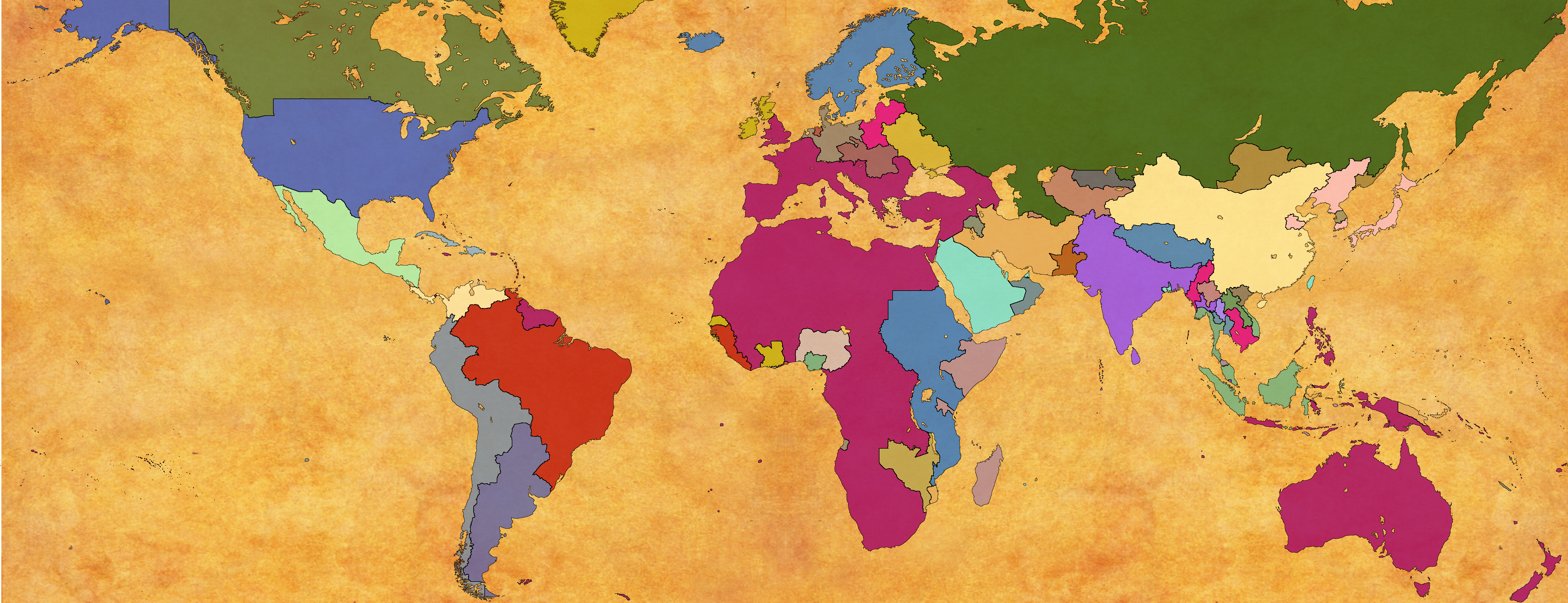
The Address
1895 began without much fanfare. We continued Our efforts to improve the economy, ending support to inefficient factories and opening new profitable ones in their stead. It was almost exciting when in February, Manchuria refused entry to Our ambassador. The incident was quickly negotiated away, which left some people dissatisfied.
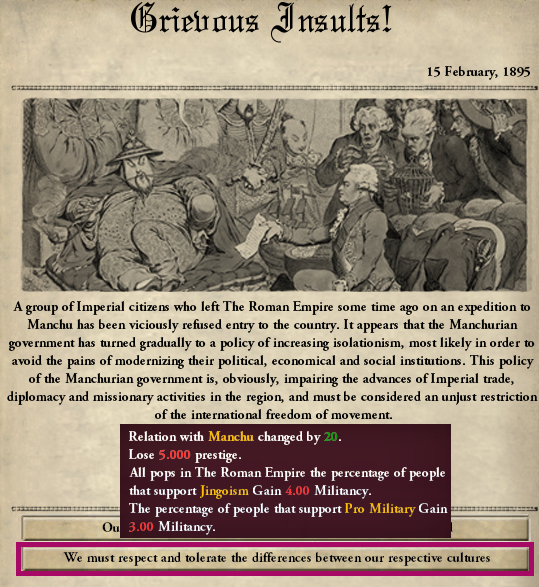
In March, the Olympic Committee decided that We should host the first games. We began work to prepare Constantinople for this august event.
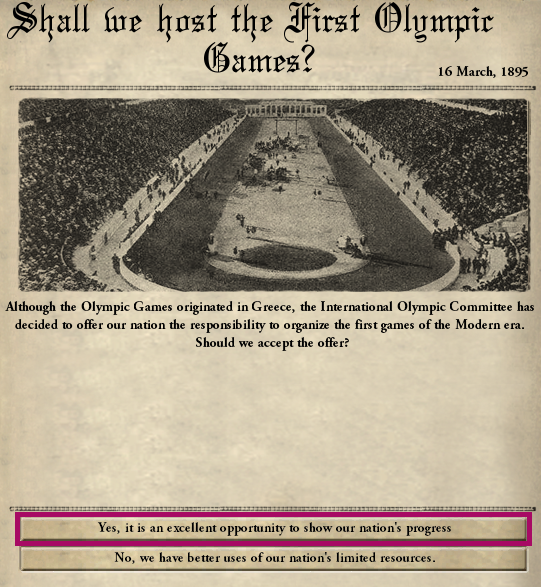
And by the end of June, Senator Smithereens informed Us that the navy could build larger naval bases to better support the navy. We instructed him to begin a major program of base building, and also to put the navy’s logistics onto an organized system.
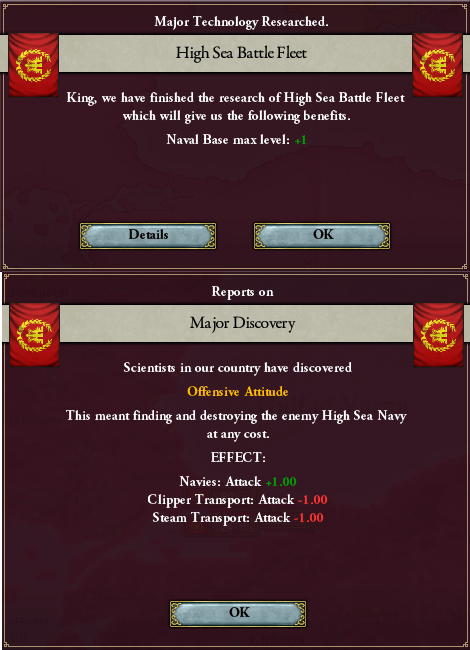
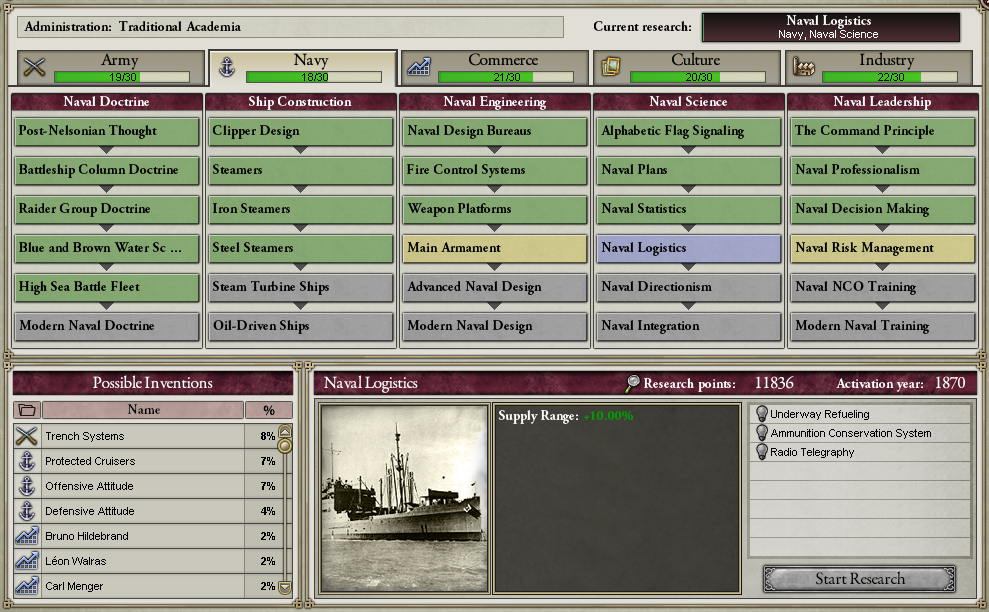
And before the end of the year, a practical automobile had been designed. We immediately ordered several factories opened to produce them. Both these factories and the naval bases necessitated a tax raise.
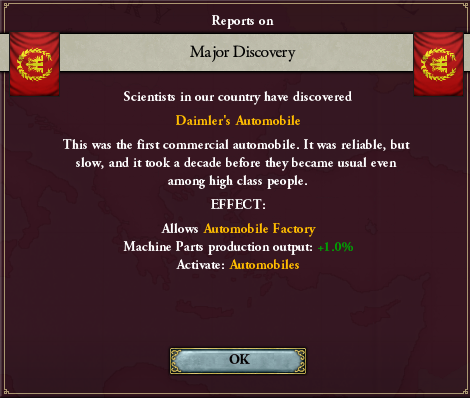
When Senator Smithereens announced that several plans for improving the navy’s logistics would begin implementation, We left him to oversee these plans and the naval base expansion, and asked Senator Kvensson to procure improved armaments for the navy.
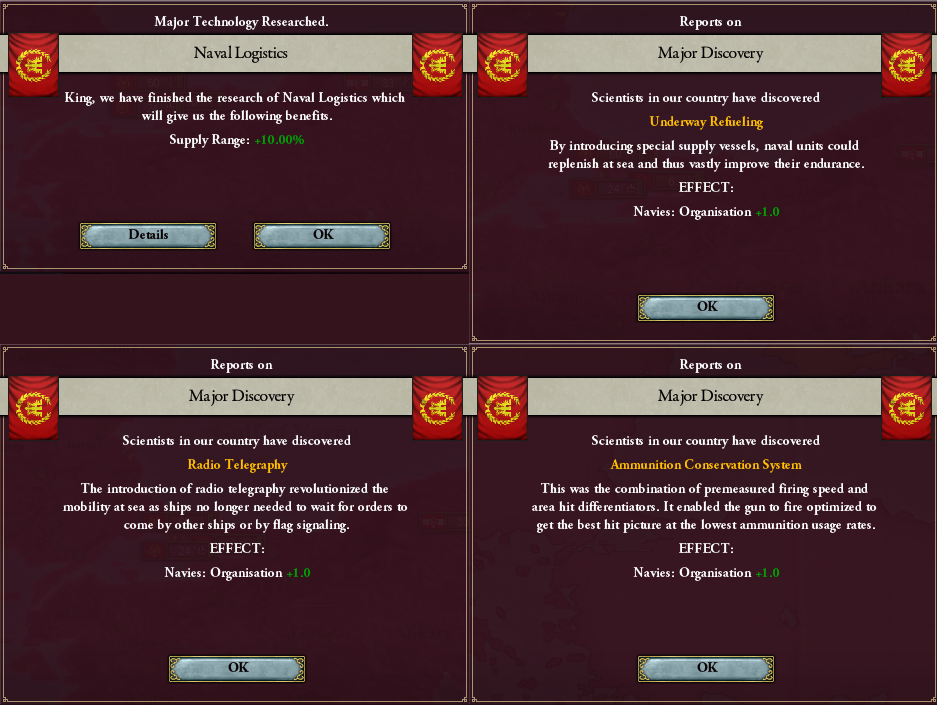
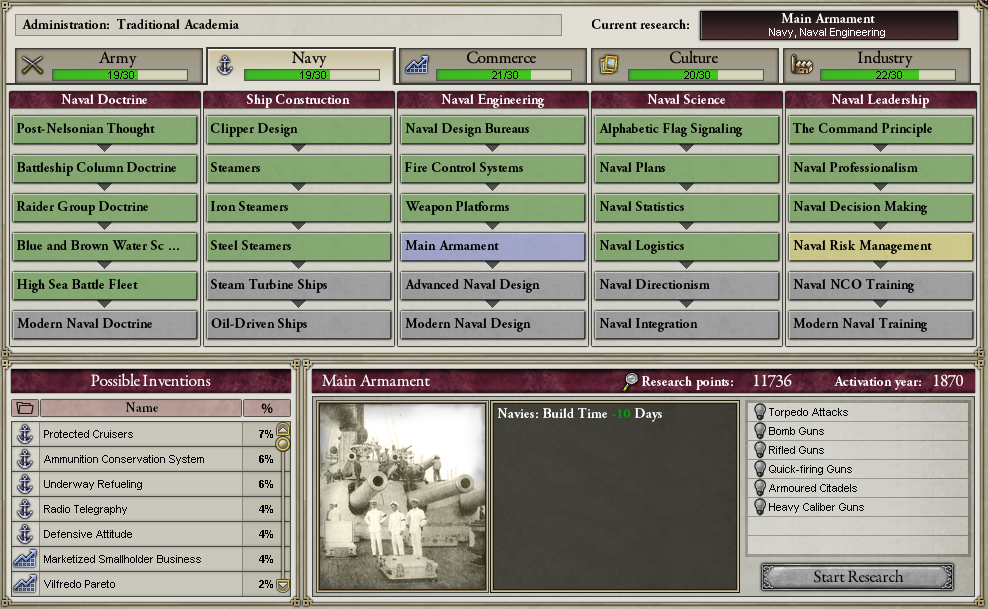
In late June of 1897, Reactionaries who had been angered by the raised taxes funding new factories and naval bases rose up throughout the Empire. They were defeated by early November.
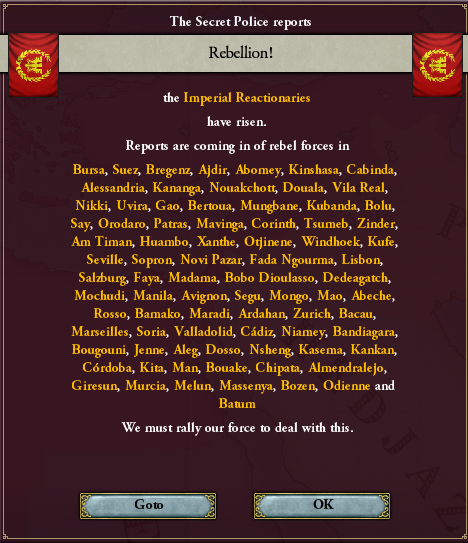
By late August, Senator Kvensson had begun procuring specific improvements. He pointed out that procuring improved artillery for the legions would aid in procuring better naval guns, so We tasked him with doing so.
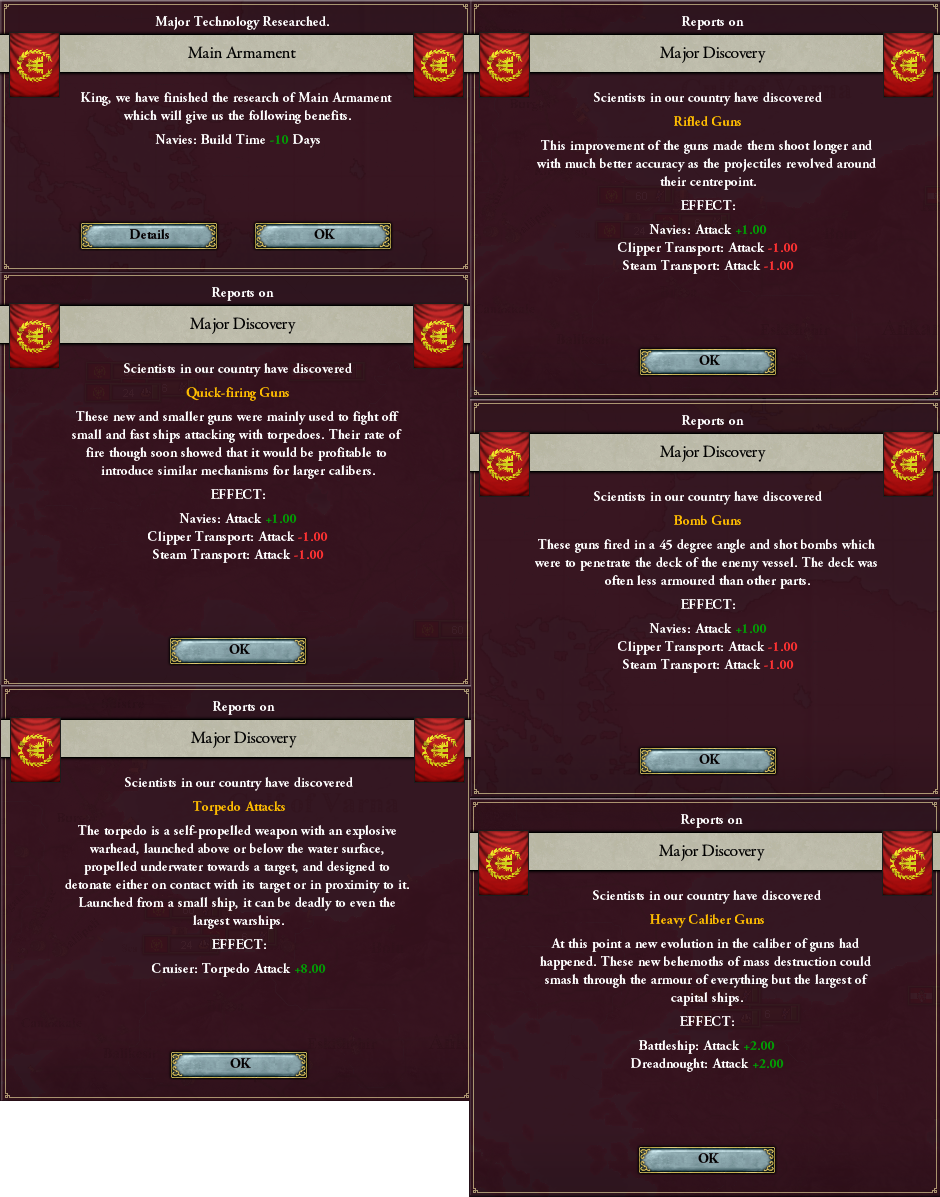
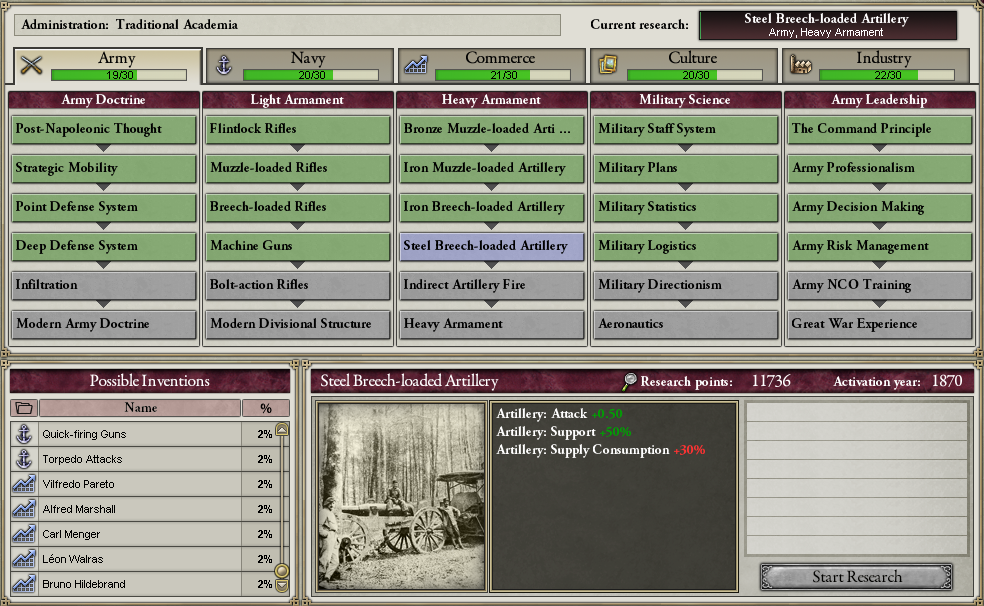
In October, Senator Smithereens announced that a new ship design had been finalized, allowing for Cruisers. We had him begin constructing new fleets immediately.
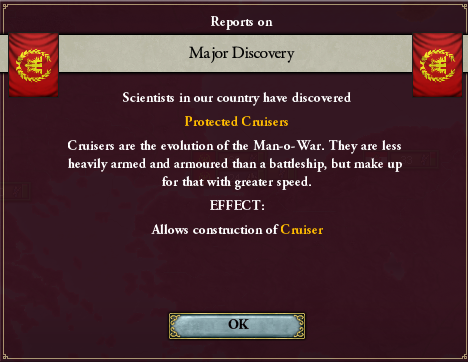
Meanwhile, We funded an expedition to explore the North Pole.
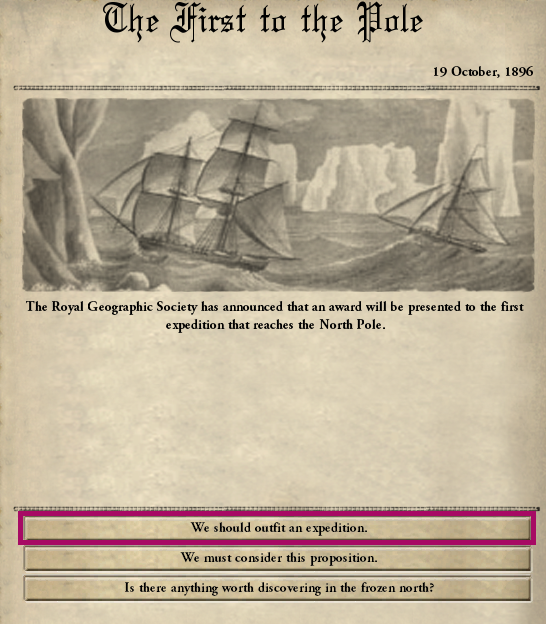
When the new artillery had been procured, We asked industry leaders to discover areas where human labor could be removed from the manufacturing process.
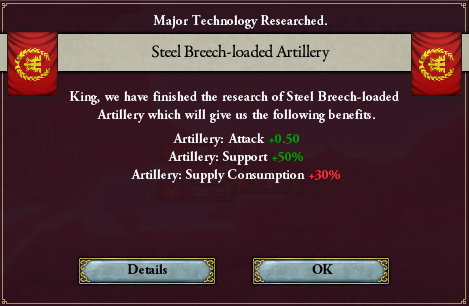
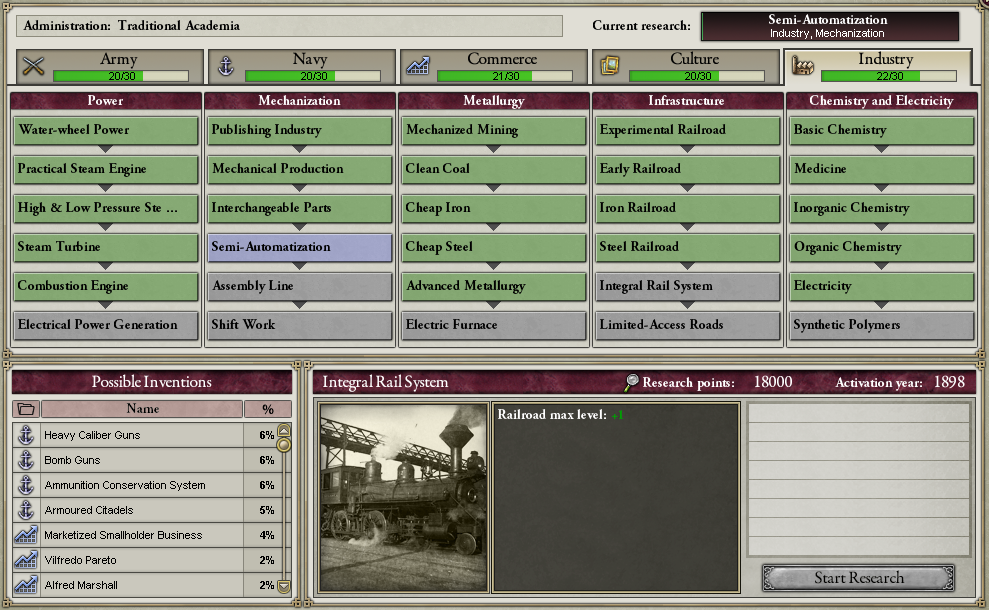
When the North Pole expedition returned without success, We funded a second expedition.
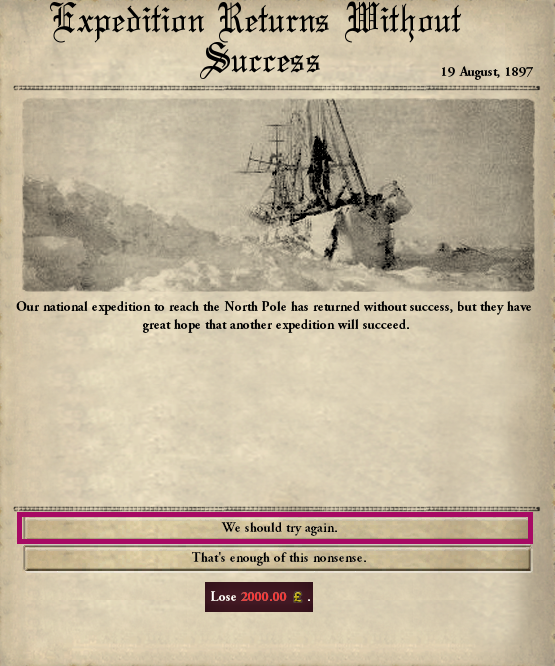
And when the automation advances for the Empire’s factories had come to fruition, a new opportunity presented itself. Sigmund Freud, a Burgundian living along the Rhine, had begun to develop methods of analyzing an individual’s mind and behavior, which he proposed were largely due to events in their childhood. We funded a chair for him at the University of Constantinople, and the field of psychoanalysis quickly developed.
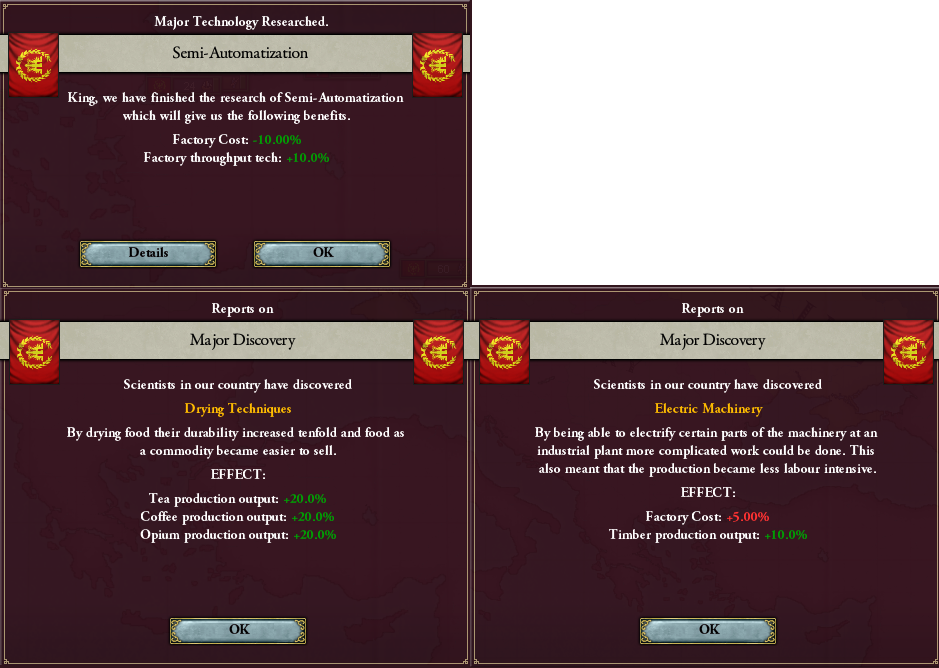
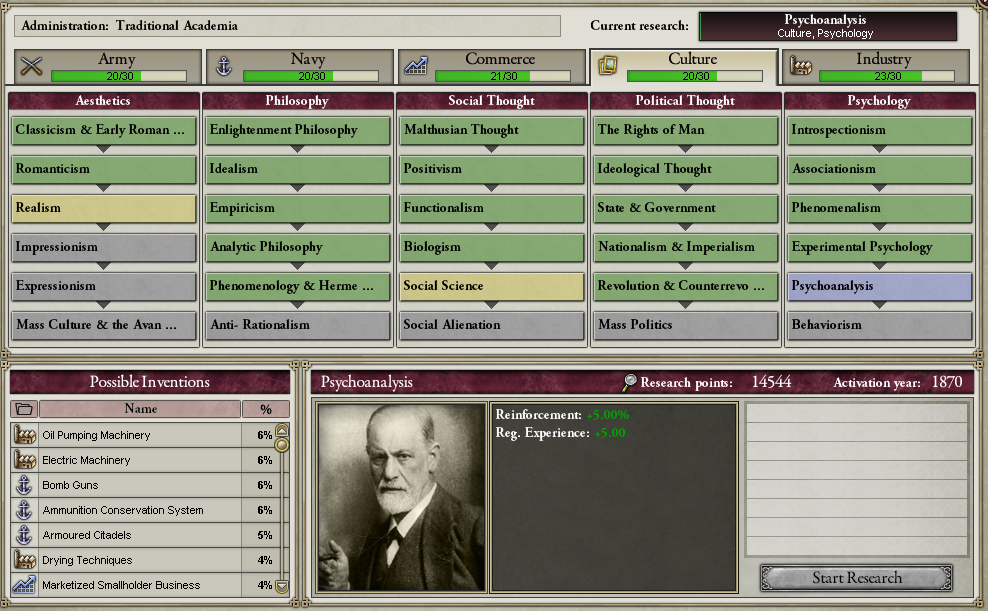
In November of 1897, yet another Communist rebellion erupted. Despite the rebellion, We put together a team to compete in the Olympics.
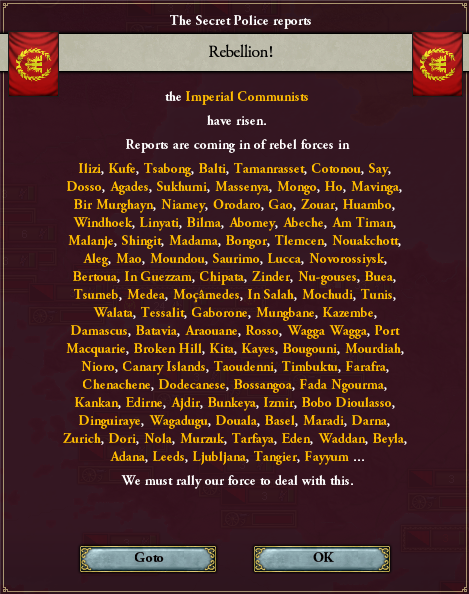
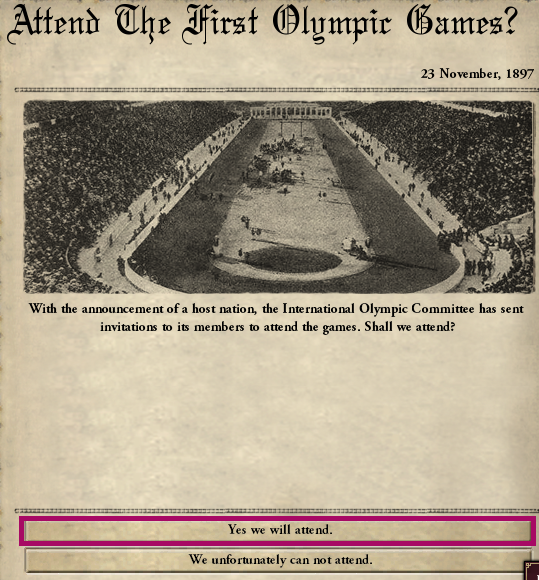
And at the beginning of December, We began the opening ceremony of the first modern Olympics! Several of our athletes were victorious, bringing home a great many medals.
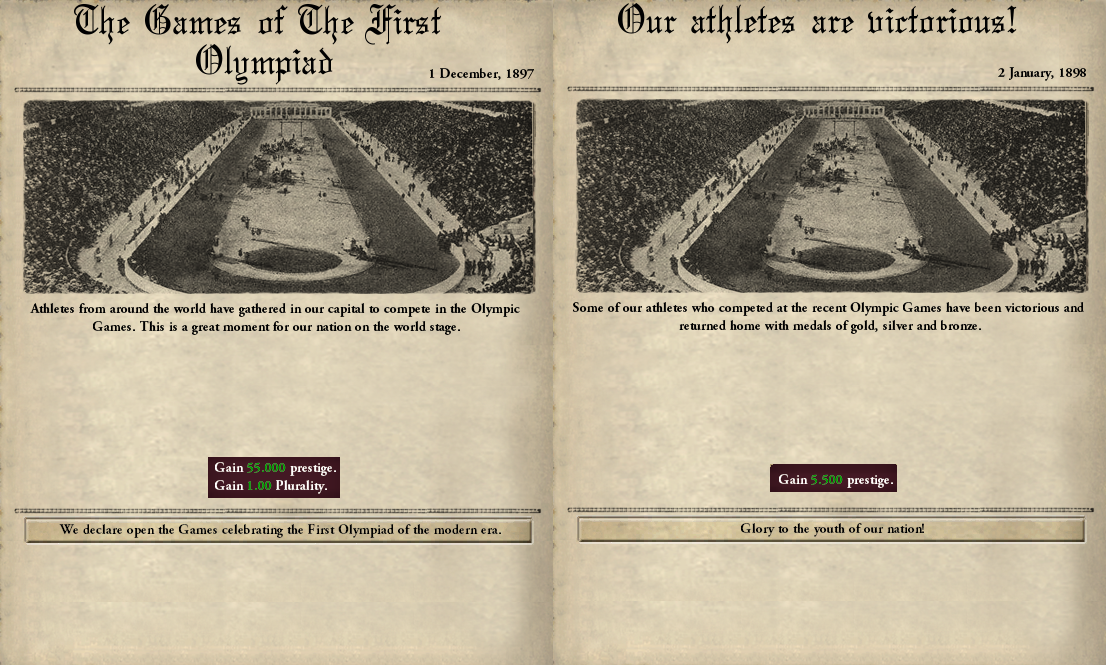
In March of 1898, Iraq demonstrated how dangerous communist revolutions could be when they fell under the sway of one.
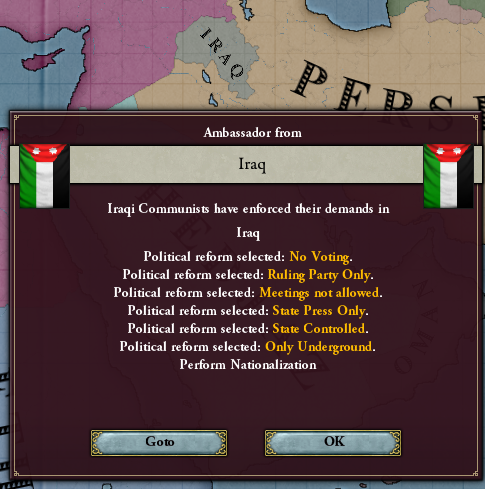
The ongoing rebellion demonstrated the difficulties with our system of state capitalism, and so We sought to improve the incentives for private industry to supply the needs of the Empire’s citizens.
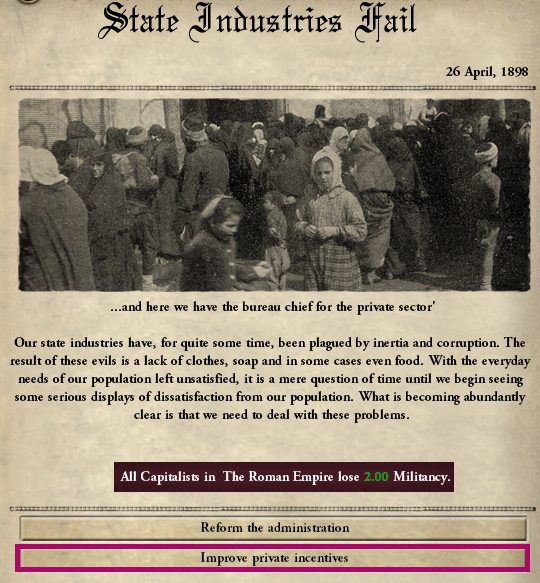
But then in June, Jacobins who disliked these reforms rebelled in turn.
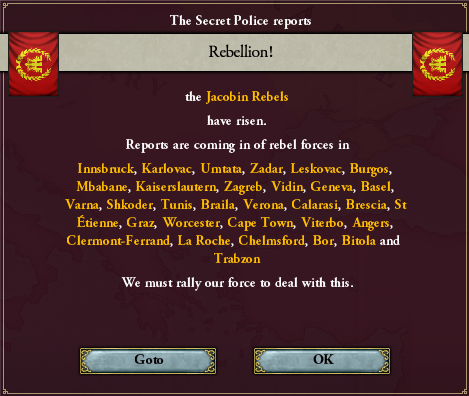
By late July the rebellions had nearly been mopped up, and psychoanalysis was becoming a new area of much research. We then set about having the whole rail system of the Empire made into an integrated system, with a single rail gauge, stations, and everything fully connected. Or rather, two integrated systems: one for goods, and one for passengers.
Just before August, We noticed that Japan had seized one of Ming’s provinces. And now Russia was warring against them for another. We disliked to see another ancient Empire so mistreated, and so offered them an alliance, which they accepted.
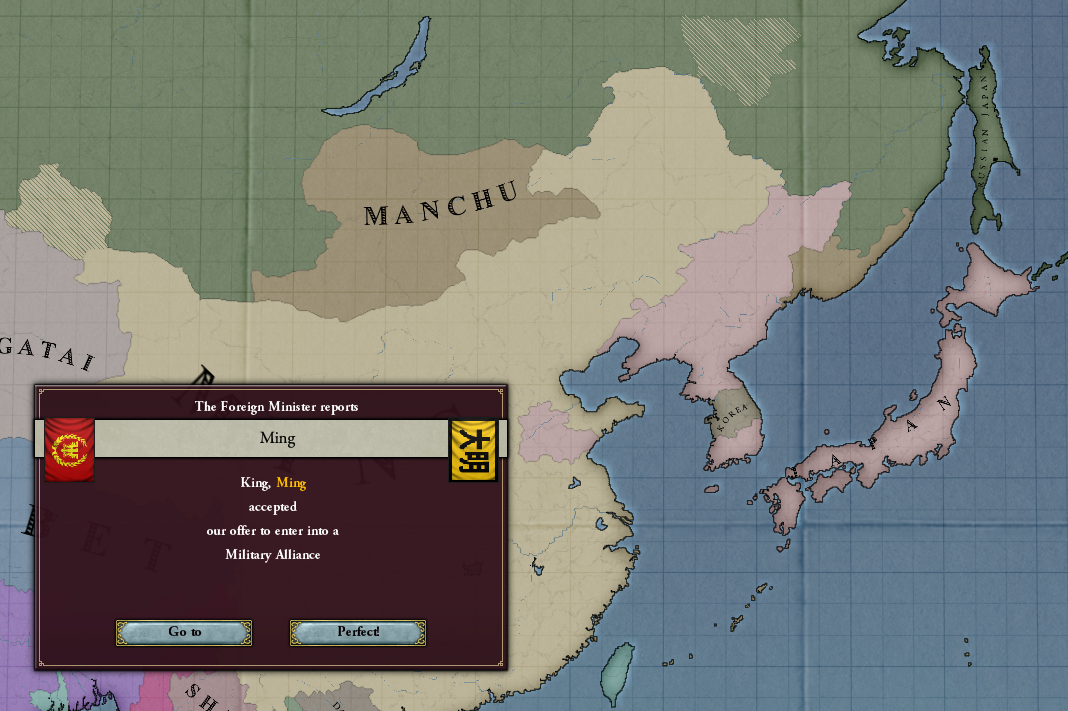
While this wasn’t in time to stop Russia’s depredations, it finally gave Ming the courage to retake lands that had long ago fallen under the sway of the Oriat Horde.
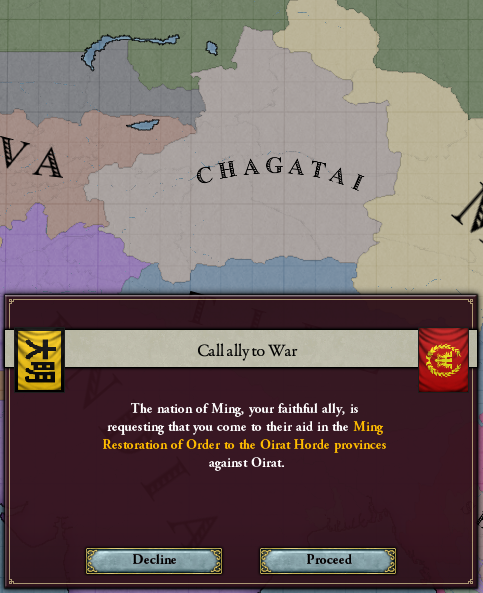
At the beginning of 1899, We attempted something new and drastic with the economy and removed all subsidies to factories. We had noticed that if a factory was not making any profit, then nobody got paid, even though subsidies might keep the factory running. Better instead to pay unemployment and allow the resources wastefully going to the factories be used in more profitable ventures. This seemed successful, with the unemployment subsidies costing much less than the factory subsidies. As well, We were able to cut taxes, better enabling people to provide for their families.
While this was being implemented, Ming won their war against the Oriat Horde. And a few months later, the improved railroads were ready to be implemented. Scotland, meanwhile, fell to reactionaries.
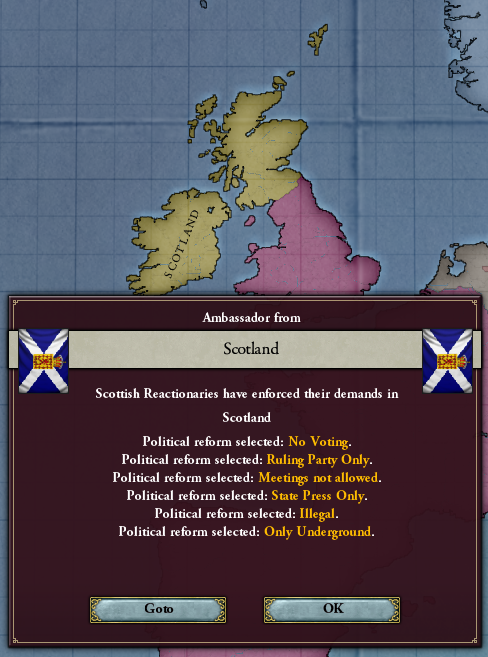
But the year passed, with the Empire’s useful industry growing like never before. It became very clear which factories were worth expanding, and expand they did.
And now, Senators, it is the year 1900. It is an interesting time, where now several departments at the University of Constantinople claim that truth may lie in realms we cannot reach through pure reason.
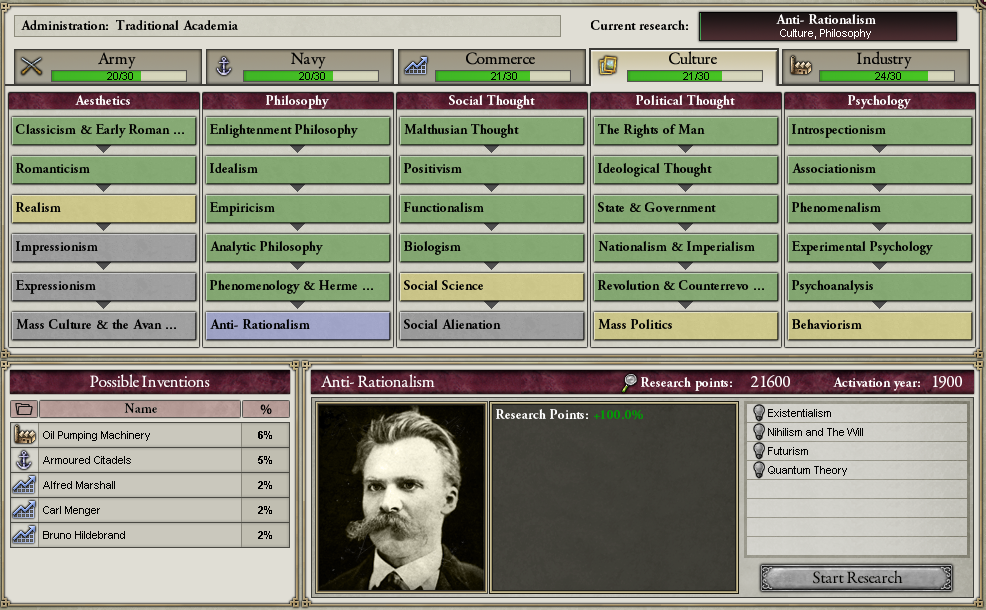
The last five years have seen great improvements in our military, in the number of noted economists we have produced, and in yet more improved management for our companies.
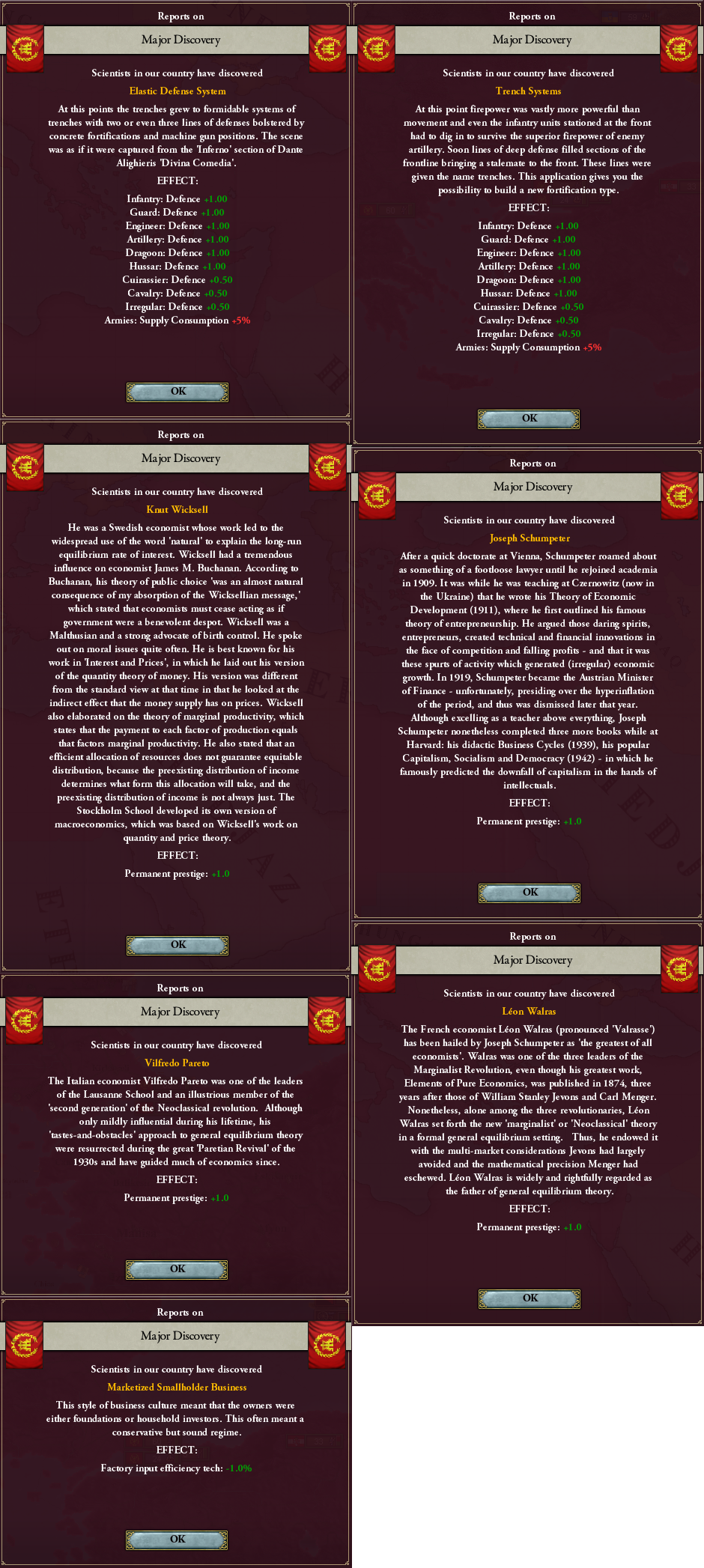
Meanwhile, Our borders and ports are more secure then ever. Our naval bases are phenomenal. And Our navy has been greatly improved. It now consists of several fleets of five battleships and ten cruisers. These fleets are the Gibraltar Fleet, the Red Sea Fleet, the East Mediterranean Fleet, the West Mediterranean Fleet, and the North Sea Fleet. The West African Fleet is under construction, and We plan to create fleets for Guyana, South Africa, the Philippines, and Oceania.
Truly this is a wonderful time to be alive.
Senators' Replies
Hail Rome!
- Senator Palaiologos
Ah, automobiles. Truly the symbol of the Empire’s progress, despite the Konstantinians’ efforts to hold it back. I bought one of them myself and even drove it to the Senate!
The Olympics! I attended one such game which was held in Athens, and the Roman athletes did not disappoint! The youth of the Empire are strong and smart, and they brought glory to all of us! Truly a great era to live in, with the Olympics back to show off the glory of our youth!
I believe that our alliance with the Ming will bear great fruit. The Ming shall help us contain the Russians in Asia as well as uplift many non-industrialized people into modernity. The communists and Jacobins though are still a threat, despite the fact that the Secret Police has been working day and night to investigate and assist in crushing rebellions before they occur. Again, I humbly recommend that reforms be passed for the welfare of the people. After all, they are all Roman citizens and must be treated appropriately, else it shall be a stain on our reputation.
- Senator Doukas
((Private))
Dr. Stavridis’s Diary
18 September, 188?
I drove at once over and arrived early. Keeping my cab at the gate, I went up the avenue alone. I knocked gently and rang as quietly as possible, for I feared to disturb Loukia or her mother, and hoped to only bring a servant to the door. After a while, finding no response, I knocked and rang again, still no answer. I cursed the laziness of the servants that they should lie abed at such an hour, for it was now ten o’clock, and so rang and knocked again, but more impatiently, but still without response. Hitherto I had blamed only the servants, but now a terrible fear began to assail me. Was this desolation but another link in the chain of doom which seemed drawing tight round us? Was it indeed a house of death to which I had come, too late? I know that minutes, even seconds of delay, might mean hours of danger to Loukia, if she had had again one of those frightful relapses, and I went round the house to try if I could find by chance an entry anywhere. I could find no means of ingress. Every window and door was fastened and locked, and I returned baffled to the porch. As I did so, I heard the rapid pit-pat of a swiftly driven horse’s feet. They stopped at the gate, and a few seconds later I met Von Habsburg running up the avenue. When he saw me, he gasped out, “Zhen it vas du, und just arrived. How ist she? Are ve zoo late? Did du nicht get mein telegram?” I answered as quickly and coherently as I could that I had only got his telegram early in the morning, and had not a minute in coming here, and that I could not make any one in the house hear me. He paused and raised his hat as he said solemnly, “Zhen ich fear ve are zoo late. Gött’s vill be done!” With his usual recuperative energy, he went on, “Komm. If zhere be no vay open to get in, ve must make one. Time ist all in all to us now.” We went round to the back of the house, where there was a kitchen window. The Professor took a small surgical saw from his case, and handing it to me, pointed to the iron bars which guarded the window. I attacked them at once and had very soon cut through three of them. Then with a long, thin knife we pushed back the fastening of the sashes and opened the window. I helped the Professor in, and followed him. There was no one in the kitchen or in the servants’ rooms, which were close at hand. We tried all the rooms as we went along, and in the dining room, dimly lit by rays of light through the shutters, found four servant women lying on the floor. There was no need to think them dead, for their stertorous breathing and the acrid smell of laudanum in the room left no doubt as to their condition. Von Habsburg and I looked at each other, and as we moved away he said, “We can attend to them later.” Then we ascended to Loukia’s room. For an instant or two we paused at the door to listen, but there was no sound that we could hear. With white faces and trembling hands, we opened the door gently, and entered the room. How shall I describe what we saw? On the bed lay two women, Loukia and her mother. The latter lay farthest in, and she was covered with a white sheet, the edge of which had been blown back by the drought through the broken window, showing the drawn, white, face, with a look of terror fixed upon it. By her side lay Loukia, with face white and still more drawn. The flowers which had been round her neck we found upon her mother’s bosom, and her throat was bare, showing the two little wounds which we had noticed before, but looking horribly white and mangled. Without a word the Professor bent over the bed, his head almost touching poor Loukia’s breast. Then he gave a quick turn of his head, as of one who listens, and leaping to his feet, he cried out to me, “It ist nicht yet too late! Schnell! Schnell! Bring zhe brandy!” I flew downstairs and returned with it, taking care to smell and taste it, lest it, too, were drugged like the decanter of sherry which I found on the table. The maids were still breathing, but more restlessly, and I fancied that the narcotic was wearing off. I did not stay to make sure, but returned to Von Habsburg. He rubbed the brandy, as on another occasion, on her lips and gums and on her wrists and the palms of her hands. He said to me, “Ich kann do zhis, all zhat kann be at zhe present. Du go vake zhose maids. Flick zhem in zhe face vith a vet towel, und flick zhem hard. Make zhem get heat und fire und a varm bath. Zhis poor soul ist nearly as cold as zhat beside her. She vill need be heated before ve kann do anyzhing more.” I went at once, and found little difficulty in waking three of the women. The fourth was only a young girl, and the drug had evidently affected her more strongly so I lifted her on the sofa and let her sleep. The others were dazed at first, but as remembrance came back to them they cried and sobbed in a hysterical manner. I was stern with them, however, and would not let them talk. I told them that one life was bad enough to lose, and if they delayed they would sacrifice Miss Loukia. So, sobbing and crying they went about their way, half-clad as they were, and prepared fire and water. Fortunately, the kitchen and boiler fires were still alive, and there was no lack of hot water. We got a bath and carried Loukia out as she was and placed her in it. Whilst we were busy chafing her limbs there was a knock at the hall door. One of the maids ran off, hurried on some more clothes, and opened it. Then she returned and whispered to us that there was a gentleman who had come with a message from Senator Doukas. I bade her simply tell him that he must wait, for we could see no one now. She went away with the message, and, engrossed with our work, I clean forgot all about him.
I never saw in all my experience the Professor work in such deadly earnest. I knew, as he knew, that it was a stand-up fight with death, and in a pause told him so. He answered me in a way that I did not understand, but with the sternest look that his face could wear.
“If zhat vere all, ich vould stop here vhere ve are now, und let her fade away into peace, for ich see no light in life over her horizon.” He went on with his work with, if possible, renewed and more frenzied vigour.
Presently we both began to be conscious that the heat was beginning to be of some effect. Loukia’s heart beat a trifle more audibly to the stethoscope, and her lungs had a perceptible movement. Von Habsburg’s face almost beamed, and as we lifted her from the bath and rolled her in a hot sheet to dry her he said to me, “Zhe first gain ist ours! Check to zhe König!”
We took Loukia into another room, which had by now been prepared, and laid her in bed and forced a few drops of brandy down her throat. I noticed that Von Habsburg tied a soft silk handkerchief round her throat. She was still unconscious, and was quite as bad as, if not worse than, we had ever seen her.
Von Habsburg called in one of the women, and told her to stay with her and not to take her eyes off her till we returned, and then beckoned me out of the room.
“Ve must consult as to vhat ist to be done,” he said as we descended the stairs. In the hall he opened the dining room door, and we passed in, he closing the door carefully behind him. The shutters had been opened, but the blinds were already down, with that obedience to the etiquette of death which the Greek woman of the lower classes always rigidly observes. The room was, therefore, dimly dark. It was, however, light enough for our purposes. Von Habsburg’s sternness was somewhat relieved by a look of perplexity. He was evidently torturing his mind about something, so I waited for an instant, and he spoke.
“Vhat are ve to do now? Vhere are ve to turn for help? Ve must have another zransfusion of blüt, and zhat soon, or zhat poor fraulein’s life von’t be vorth an hour’s purchase. Du are exhausted already. Ich am exhausted too. Ich fear to zrust zhose vomen, even if zhey vould have courage to submit. Vhat are ve to do für someone vho vill open his veins for her?”
“What’s the matter with me, anyhow?”
The voice came from the sofa across the room, and its tones brought relief and joy to my heart, for they were those of Markos Quintus, the Oceanian. We didn’t notice him at all.
Von Habsburg started angrily at the first sound, but his face softened and a glad look came into his eyes as I cried out, “Markos Quintus!” and rushed towards him with outstretched hands.
“What brought you here?” I cried as our hands met.
“I guess Mike is the cause.”
He handed me a telegram: ‘Have not heard from Stavridis for three days, and am terribly anxious. Cannot leave. Mother still in same condition. Send me word how Loukia is. Do not delay. –Doukas.’
“I think I came just in the nick of time. You know you have only to tell me what to do.”
Von Habsburg strode forward, and took his hand, looking him straight in the eyes as he said, “A brave man’s blüt ist zhe best zhing on zhis earth vhen a voman ist in zrouble. Du’re a man und no mistake. Vell, zhe devil may vork against us für all he’s vorth, but Gött sends us men vhen ve vant zhem.”
Once again we went through that ghastly operation. I have not the heart to go through with the details. Loukia had got a terrible shock and it told on her more than before, for though plenty of blood went into her veins, her body did not respond to the treatment as well as on the other occasions. Her struggle back into life was something frightful to see and hear. However, the action of both heart and lungs improved, and Von Habsburg made a sub-cutaneous injection of morphia, as before, and with good effect. Her faint became a profound slumber. The Professor watched whilst I went downstairs with Markos Quintus, and sent one of the maids to pay off one of the cabmen who were waiting.
I left Markos lying down after having a glass of wine, and told the cook to get ready a good breakfast. Then a thought struck me, and I went back to the room where Loukia now was. When I came softly in, I found Von Habsburg with a sheet or two of note paper in his hand. He had evidently read it, and was thinking it over as he sat with his hand to his brow. There was a look of grim satisfaction in his face, as of one who has had a doubt solved. He handed me the paper saying only, “It dropped from Loukia breast vhen ve carried her to zhe bath.”
When I had read it, I stood looking at the Professor, and after a pause asked him, “In God’s name, what does it all mean? Was she, or is she, mad, or what sort of horrible danger is it?” I was so bewildered that I did not know what to say more. Von Habsburg put out his hand and took the paper, saying,
“Do nicht trouble about it now. Forget it for zhe present. Du shall know und understand it all in güt time, but it vill be later. And now vhat ist it that du came to mich to say?” This brought me back to fact, and I was all myself again.
“I came to speak about the certificate of death. If we do not act properly and wisely, there may be an inquest, and that paper would have to be produced. I am in hopes that we need have no inquest, for if we had it would surely kill poor Loukia, if nothing else did. I know, and you know, and the other doctor who attended her knows, that Mrs. Este-Ravenna had disease of the heart, and we can certify that she died of it. Let us fill up the certificate at once, and I shall take it myself to the registrar and go on to the undertaker.”
“Güt, oh mein fruend John! Vell zhought of! Truly Miss Loukia, if she be sad in zhe foes zhat beset her, ist at least happy in zhe fruends zhat love her. Eine, zwei, drei, all open zheir veins für her, besides one old man. Ah, ja, ich know, fruend John. Ich am nicht blind! Ich love du all zhe more für it! Now go.”
In the hall I met Markos Quintus, with a telegram for Michael telling him that Mrs. Este-Ravenna was dead, that Loukia also had been ill, but was now going on better, and that Von Habsburg and I were with her. I told him where I was going, and he hurried me out, but as I was going said, “When you come back, Jack, may I have two words with you all to ourselves?” I nodded in reply and went out. I found no difficulty about the registration, and arranged with the local undertaker to come up in the evening to measure for the coffin and to make arrangements.
When I got back Markos was waiting for me. I told him I would see him as soon as I knew about Loukia, and went up to her room. She was still sleeping, and the Professor seemingly had not moved from his seat at her side. From his putting his finger to his lips, I gathered that he expected her to wake before long and was afraid of fore-stalling nature. So I went down to Markos and took him into the breakfast room, where the blinds were not drawn down, and which was a little more cheerful, or rather less cheerless, than the other rooms.
When we were alone, he said to me, “John Stavridis, I don’t want to shove myself in anywhere where I’ve no right to be, but this is no ordinary case. You know I loved that girl and wanted to marry her, but although that’s all past and gone, I can’t help feeling anxious about her all the same. What is it that’s wrong with her? The German, and a fine old fellow he is, I can see that, said that time you two came into the room, that you must have another transfusion of blood, and that both you and he were exhausted. Now I know well that you medical men speak in camera, and that a man must not expect to know what they consult about in private. But this is no common matter, and whatever it is, I have done my part. Is not that so?”
“That’s so,” I said, and he went on.
“I take it that both you and Von Habsburg had done already what I did today. Is not that so?”
“That’s so.”
“And I guess Mike was in it too. When I saw him four days ago down at his own place he looked queer. I have not seen anything pulled down so quick since I was on the Pampas and had a mare that I was fond of go to grass all in a night. One of those big bats that they call vampires had got at her in the night, and what with his gorge and the vein left open, there wasn’t enough blood in her to let her stand up, and I had to put a bullet through her as she lay. Jack, if you may tell me without betraying confidence, Michael was the first, is not that so?”
As he spoke the poor fellow looked terribly anxious. He was in a torture of suspense regarding the woman he loved, and his utter ignorance of the terrible mystery which seemed to surround her intensified his pain. His very heart was bleeding, and it took all the manhood of him, and there was a royal lot of it, too, to keep him from breaking down. I paused before answering, for I felt that I must not betray anything which the Professor wished kept secret, but already he knew so much, and guessed so much, that there could be no reason for not answering, so I answered in the same phrase.
“That’s so.”
“And how long has this been going on?”
“About ten days.”
“Ten days! Then I guess, John Stavridis, that that poor pretty creature that we all love has had put into her veins within that time the blood of four strong men. Man alive, her whole body wouldn’t hold it.” Then coming close to me, he spoke in a fierce half-whisper. “What took it out?”
I shook my head. “That,” I said, “is the crux. Von Habsburg is simply frantic about it, and I am at my wits’ end. I can’t even hazard a guess. There has been a series of little circumstances which have thrown out all our calculations as to Loukia being properly watched. But these shall not occur again. Here we stay until all be well, or ill.”
Markos held out his hand. “Count me in,” he said. “You and the German will tell me what to do, and I’ll do it.”
When she woke late in the afternoon, Loukia’s first movement was to feel in her breast, and to my surprise, produced the paper which Von Habsburg had given me to read. The careful Professor had replaced it where it had come from, lest on waking she should be alarmed. Her eyes then lit on Von Habsburg and on me too, and gladdened. Then she looked round the room, and seeing where she was, shuddered. She gave a loud cry, and put her poor thin hands before her pale face.
We both understood what was meant, that she had realized to the full her mother’s death. So we tried what we could to comfort her. Doubtless sympathy eased her somewhat, but she was very low in thought and spirit, and wept silently and weakly for a long time. We told her that either or both of us would now remain with her all the time, and that seemed to comfort her. Towards dusk she fell into a doze. Here a very odd thing occurred. Whilst still asleep she took the paper from her breast and tore it in two. Von Habsburg stepped over and took the pieces from her. All the same, however, she went on with the action of tearing, as though the material were still in her hands. Finally she lifted her hands and opened them as though scattering the fragments. Von Habsburg seemed surprised, and his brows gathered as if in thought, but he said nothing.19 September.
All last night she slept fitfully, being always afraid to sleep, and something weaker when she woke from it. The Professor and I took in turns to watch, and we never left her for a moment unattended. Markos Quintus said nothing about his intention, but I knew that all night long he patrolled round and round the house.
When the day came, its searching light showed the ravages in poor Loukia’s strength. She was hardly able to turn her head, and the little nourishment which she could take seemed to do her no good. At times she slept, and both Von Habsburg and I noticed the difference in her, between sleeping and waking. Whilst asleep she looked stronger, although more haggard, and her breathing was softer. Her open mouth showed the pale gums drawn back from the teeth, which looked positively longer and sharper than usual. When she woke the softness of her eyes evidently changed the expression, for she looked her own self, although a dying one. In the afternoon she asked for Michael, and we telegraphed for him. Markos went off to meet him at the station.
When he arrived it was nearly six o’clock, and the sun was setting full and warm, and the red light streamed in through the window and gave more color to the pale cheeks. When he saw her, Michael was simply choking with emotion, and none of us could speak. In the hours that had passed, the fits of sleep, or the comatose condition that passed for it, had grown more frequent, so that the pauses when conversation was possible were shortened. Michael’s presence, however, seemed to act as a stimulant. She rallied a little, and spoke to him more brightly than she had done since we arrived. He too pulled himself together, and spoke as cheerily as he could, so that the best was made of everything.
It is now nearly one o’clock, and he and Von Hasburg are sitting with her. I am to relieve them in a quarter of an hour, and I am entering this on Loukia’s phonograph. Until six o’clock they are to try to rest. I fear that tomorrow will end our watching, for the shock has been too great. The poor child cannot rally. God help us all.Letter: Mara Dalassenos to Loukia Este-Ravenna (Unopened by her)
17 September, 188?
My dearest Loukia,
It seems an age since I heard from you, or indeed since I wrote. You will pardon me, I know, for all my faults when you have read all my budget of news. Well, I got my husband back all right. When we arrived at [REDACTED] there was a carriage waiting for us, and in it, though he had an attack of gout, Strategos Girakos. He took us to his house, where there were rooms for us all nice and comfortable, and we dined together. After dinner Strategos Girakos said,
‘My dears, I want to drink your health and prosperity, and may every blessing attend you both. I knew you both from children, and have, with love and pride, seen you grow up; I trained Ioannes myself, and to think he is also a strategosnow while he is still in his youth! Now I want you to make your home here with me. I have left to me neither chick nor child. All are gone, and in my will I have left both of you everything.’ I cried, Loukia dear, as Ioannes and the old man clasped hands. Our evening was a very, very happy one.
So here we are, installed in this beautiful old house, and from both my bedroom and the drawing room I can see the great elms of the cathedral close, with their great black stems standing out against the old yellow stone of the cathedral, and I can hear the rooks overhead cawing and cawing and chattering and chattering and gossiping all day, after the manner of rooks–and humans. I am busy, I need not tell you, arranging things and housekeeping. Ioannes and Strategos Girakos are busy all day, for now that Ioannes is a strategos, Strategos Girakos wants to tell him all about the recent rebellions that followed in the wake of Konstantinos’s failed coup.
How is your dear mother getting on? I wish I could run up to town for a day or two to see you, dear, but I, dare not go yet, with so much on my shoulders, and Ioannes wants looking after still. He is beginning to put some flesh on his bones again, but he was terribly weakened by the long illness. Even now he sometimes starts out of his sleep in a sudden way and awakes all trembling until I can coax him back to his usual placidity. However, thank God, these occasions grow less frequent as the days go on, and they will in time pass away altogether, I trust. And now I have told you my news, let me ask yours. When are you to be married, and where, and who is to perform the ceremony, and what are you to wear, and is it to be a public or private wedding? Tell me all about it, dear, tell me all about everything, for there is nothing which interests you which will not be dear to me. Ioannes asks me to send his ‘respectful duty’, but I do not think that is good enough from the newest member of the General Staff. And so, as you love me, and he loves me, and I love you with all the moods and tenses of the verb, I send you simply his ‘love’ instead. Goodbye, my dearest Loukia, and blessings on you.Yours,
Mara Dalassenos
Report from Patrikios Herschel, MD, MRCSLK, QCPI, Etc., Etc., to John Stavridis, MD
20 September 188?
My dear Sir:
In accordance with your wishes, I enclose report of the conditions of everything left in my charge. With regard to the patient Renato there is more to say. He has had another outbreak, which might have had a dreadful ending, but which, as it fortunately happened, was unattended with any unhappy results. This afternoon a carrier’s cart with two men made a call at the empty house whose grounds abut on ours, the house to which, you will remember, the patient twice ran away. The men stopped at our gate to ask the porter their way, as they were strangers.
I was myself looking out of the study window, having a smoke after dinner, and saw one of them come up to the house. As he passed the window of Renato’s room, the patient began to rate him from within, and called him all the foul names he could lay his tongue to. The man, who seemed a decent fellow enough, contented himself by telling him to ‘shut up for a foul-mouthed beggar’, whereon our man accused him of robbing him and wanting to murder him and said that he would hinder him if he were to swing for it. I opened the window and signed to the man not to notice, so he contented himself after looking the place over and making up his mind as to what kind of place he had got to by saying, ‘Lor’ bless yer, sir, I wouldn’t mind what was said to me in a bloomin’ madhouse. I pity ye and the guv’nor for havin’ to live in the house with a wild beast like that.’
Then he asked his way civilly enough, and I told him where the gate of the empty house was. He went away followed by threats and curses and revilings from our man. I went down to see if I could make out any cause for his anger, since he is usually such a well-behaved man, and except his violent fits nothing of the kind had ever occurred. I found him, to my astonishment, quite composed and most genial in his manner. I tried to get him to talk of the incident, but he blandly asked me questions as to what I meant, and led me to believe that he was completely oblivious of the affair. It was, I am sorry to say, however, only another instance of his cunning, for within half an hour I heard of him again. This time he had broken out through the window of his room, and was running down the avenue. I called to the attendants to follow me, and ran after him, for I feared he was intent on some mischief. My fear was justified when I saw the same cart which had passed before coming down the road, having on it some great wooden boxes. The men were wiping their foreheads, and were flushed in the face, as if with violent exercise. Before I could get up to him, the patient rushed at them, and pulling one of them off the cart, began to knock his head against the ground. If I had not seized him just at the moment, I believe he would have killed the man there and then. The other fellow jumped down and struck him over the head with the butt end of his heavy whip. It was a horrible blow, but he did not seem to mind it, but seized him also, and struggled with the three of us, pulling us to and fro as if we were kittens. You know I am no lightweight, and the others were both burly men. At first he was silent in his fighting, but as we began to master him, and the attendants were putting a strait waistcoat on him, he began to shout, ‘I’ll frustrate them! They shan’t rob me! They shan’t murder me by inches! I’ll fight for my Lord and Master!’ and all sorts of similar incoherent ravings. It was with very considerable difficulty that they got him back to the house and put him in the padded room. One of the attendants, Antonios, had a finger broken. However, I set it all right, and he is going on well.
The two carriers were at first loud in their threats of actions for damages, and promised to rain all the penalties of the law on us. Their threats were, however, mingled with some sort of indirect apology for the defeat of the two of them by a feeble madman. They said that if it had not been for the way their strength had been spent in carrying and raising the heavy boxes to the cart they would have made short work of him. They gave as another reason for their defeat the extraordinary state of drouth to which they had been reduced by the dusty nature of their occupation and the reprehensible distance from the scene of their labors of any place of public entertainment. I quite understood their drift, and after a stiff glass of strong grog, or rather more of the same, and with each a sovereign in hand, they made light of the attack, and swore that they would encounter a worse madman any day for the pleasure of meeting so ‘bloomin’ good a bloke’ as your correspondent. I took their names and addresses, in case they might be needed. They are as follows: Jack Zorbas, of Taronite’s Rents, Emperor Konstantinos XIV’s Road, [REDACTED], and Theodoros Stamatelopoulos, Procopius Dimas’s Row, Guide Court, [REDACTED]. They are both in the employment of Heraclios & Sons, Moving and Shipment Company, Orange Master’s Yard, [REDACTED].
I shall report to you any matter of interest occurring here, and shall wire you at once if there is anything of importance.
Believe me, dear Sir, yours faithfully,
Patrikios HerschelLetter, Mara Dalassenos to Loukia Este-Ravenna (Unopened by her)
18 September 188?
My dearest Loukia,
Such a sad blow has befallen us. Strategos Girakos has died very suddenly. Some may not think it so sad for us, but we had both come to so love him that it really seems as though we had lost a father. I never knew either father or mother, so that the dear old man’s death is a real blow to me. Ioannes is greatly distressed. It is not only that he feels sorrow, deep sorrow, for the dear, good man who has befriended him all his life, and now at the end has treated him like his own son and left him a fortune which to people of our modest bringing up (remember, he is not of the main Dalassenos branch) is wealth beyond the dream of avarice, but Ioannes feels it on another account. He says the amount of responsibility which it puts upon him makes him nervous. He begins to doubt himself. I try to cheer him up, and my belief in him helps him to have a belief in himself. But it is here that the grave shock that he experienced tells upon him the most. Oh, it is too hard that a sweet, simple, noble, strong nature such as his, a nature which enabled him by our dear, good friend’s aid to rise from common infantryman to kataphraktos to strategos in just a few years, should be so injured that the very essence of its strength is gone. Forgive me, dear, if I worry you with my troubles in the midst of your own happiness, but Loukia dear, I must tell someone, for the strain of keeping up a brave and cheerful appearance to Ioannes tries me, and I have no one here that I can confide in. I dread coming up to Constantinople, as we must do that day after tomorrow, for poor Strategos Girakos left in his will that he was to be buried in the grave with his father. As there are no relations at all, Ioannes will have to be chief mourner. I shall try to run over to see you, dearest, if only for a few minutes. Forgive me for troubling you. With all blessings,
Your lovingMara Dalassenos
Dr. Stavridis’s Diary
20 September.
Only resolution and habit can let me make an entry tonight. I am too miserable, too low spirited, too sick of the world and all in it, including life itself, that I would not care if I heard this moment the flapping of the wings of the angel of death. And he has been flapping those grim wings to some purpose of late, Loukia’s mother and Michael’s mother, and now . . .Let me get on with my work.
I duly relieved Von Habsburg in his watch over Loukia. We wanted Michael to go to rest also, but he refused at first. It was only when I told him that we should want him to help us during the day, and that we must not all break down for want of rest, lest Loukia should suffer, that he agreed to go.
Von Habsburg was very kind to him. “Komm, mein kinder,” he said. “Komm vith mich. Du are sick und veak, und have had much sorrow und much mental pain, as vell as zhat tax on your strength zhat ve know of. Du must nicht be alone, für to be alone ist to be full of fears und alarms. Komm to zhe drawing room, vhere zhere ist a big fire, und zhere are zwei sofas. Du shall lie on eine, and ich on zhe other, und our sympathy vill be komfort to each other, even zhough ve do nicht speak, und even if ve sleep.”
Michael went off with him, casting back a longing look on Loukia’s face, which lay in her pillow, almost whiter than the lawn. She lay quite still, and I looked around the room to see that all was as it should be. I could see that the Professor had carried out in this room, as in the other, his purpose of using the garlic. The whole of the window sashes reeked with it, and round Loukia’s neck, over the silk handkerchief which Von Habsburg made her keep on, was a rough chaplet of the same odorous flowers.
Loukia was breathing somewhat stertorously, and her face was at its worst, for the open mouth showed the pale gums. Her teeth, in the dim, uncertain light, seemed longer and sharper than they had been in the morning. In particular, by some trick of the light, the canine teeth looked longer and sharper than the rest, like fangs.
I sat down beside her, and presently she moved uneasily. At the same moment there came a sort of dull flapping or buffeting at the window. I went over to it softly, and peeped out by the corner of the blind. There was a full moonlight, and I could see that the noise was made by a great bat, which wheeled around, doubtless attracted by the light, although so dim, and every now and again struck the window with its wings. When I came back to my seat, I found that Loukia had moved slightly, and had torn away the garlic flowers from her throat. I replaced them as well as I could, and sat watching her.
Presently she woke, and I gave her food, as Von Habsburg had prescribed. She took but a little, and that languidly. There did not seem to be with her now the unconscious struggle for life and strength that had hitherto so marked her illness. It struck me as curious that the moment she became conscious she pressed the garlic flowers close to her. It was certainly odd that whenever she got into that lethargic state, with the stertorous breathing, she put the flowers from her, but that when she waked she clutched them close. There was no possibility of making any mistake about this, for in the long hours that followed, she had many spells of sleeping and waking and repeated both actions many times.
At six o’clock Von Habsburg came to relieve me. Michael had then fallen into a doze, and he mercifully let him sleep on. When he saw Loukia’s face I could hear the sissing indraw of breath, and he said to me in a sharp whisper. “Draw up zhe blind. Ich vant light!” Then he bent down, and, with his face almost touching Lucy’s, examined her carefully. He removed the flowers and lifted the silk handkerchief from her throat. As he did so he started back and I could hear his ejaculation, “Mein Gött [sic]!” as it was smothered in his throat. I bent over and looked, too, and as I noticed some queer chill came over me. The wounds on the throat had absolutely disappeared.
For fully five minutes Von Habsburg stood looking at her, with his face at its sternest. Then he turned to me and said calmly, “She ist dying. It vill nicht be long now. It vill be much difference, mark mich, vhether she dies konscious or in her sleep. Vake zhat poor man, und let him come und see zhe last. He trusts us, und ve have promised him.”
I went to the dining room and waked him. He was dazed for a moment, but when he saw the sunlight streaming in through the edges of the shutters he thought he was late, and expressed his fear. I assured him that Loukia was still asleep, but told him as gently as I could that both Von Habsburg and I feared that the end was near. He covered his face with his hands, and slid down on his knees by the sofa, where he remained, perhaps a minute, with his head buried, praying, whilst his shoulders shook with grief. I took him by the hand and raised him up. “Come,” I said, “my dear old fellow, summon all your fortitude. It will be best and easiest for her.”
When we came into Loukia’s room I could see that Von Habsburg had, with his usual forethought, been putting matters straight and making everything look as pleasing as possible. He had even brushed Loukia’s hair, so that it lay on the pillow in its usual sunny ripples. When we came into the room she opened her eyes, and seeing him, whispered softly, “Michael! Oh, my love, I am so glad you have come!”
He was stooping to kiss her, when Von Habsburg motioned him back. “Nein,” he whispered, “nicht yet! Hold her hand, it vill comfort her more.”
So Michael took her hand and knelt beside her, and she looked her best, with all the soft lines matching the angelic beauty of her eyes. Then gradually her eyes closed, and she sank to sleep. For a little bit her breast heaved softly, and her breath came and went like a tired child’s.
And then insensibly there came the strange change which I had noticed in the night. Her breathing grew stertorous, the mouth opened, and the pale gums, drawn back, made the teeth look longer and sharper than ever. In a sort of sleepwaking, vague, unconscious way she opened her eyes, which were now dull and hard at once, and said in a soft, voluptuous voice, such as I had never heard from her lips, “Michael! Oh, my love, I am so glad you have come! Kiss me!”
Michael bent eagerly over to kiss her, but at that instant Von Habsburg, who, like me, had been startled by her voice, swooped upon him, and catching him by the neck with both hands, dragged him back with a fury of strength which I never thought he could have possessed, and actually hurled him almost across the room. “Nicht on your life!” he said, “nicht für your living soul und hers!” And he stood between them like a lion at bay.
Michael was so taken aback that he did not for a moment know what to do or say, and before any impulse of violence could seize him he realized the place and the occasion, and stood silent, waiting.
I kept my eyes fixed on Loukia, as did Von Habsburg, and we saw a spasm as of rage flit like a shadow over her face. The sharp teeth clamped together. Then her eyes closed, and she breathed heavily.
Very shortly after she opened her eyes in all their softness, and putting out her poor, pale, thin hand, took Von Habsburg’s great brown one, drawing it close to her, she kissed it. “My true friend,” she said, in a faint voice, but with untellable pathos, “My true friend, and his! Oh, guard him, and give me peace!”
“Ich swear it!” he said solemnly, kneeling beside her and holding up his hand, as one who registers an oath. Then he turned to Michael, and said to him, “Komm, mein kinder, take her hand in yours, und kiss her on zhe forehead, und only once.”
Their eyes met instead of their lips, and so they parted. Loukia’s eyes closed, and Von Habsburg, who had been watching closely, took Michael’s arm, and drew him away.
And then Loukia’s breathing became stertorous again, and all at once it ceased.
“It is all over,” said Von Habsburg. “She is dead!”
I took Michael by the arm, and led him away to the drawing room, where he sat down, and covered his face with his hands, sobbing in a way that nearly broke me down to see.
I went back to the room, and found Von Habsburg looking at poor Loukia, and his face was sterner than ever. Some change had come over her body. Death had given back part of her beauty, for her brow and cheeks had recovered some of their flowing lines. Even the lips had lost their deadly pallor. It was as if the blood, no longer needed for the working of the heart, had gone to make the harshness of death as little rude as might be.
“Ve zhought her dying vhilst she slept, und sleeping vhen she died.”
I stood beside Von Habsburg, and said, “Ah well, poor girl, there is peace for her at last. It is the end!”
He turned to me, and said with grave solemnity, “Nicht so, alas! Nicht so. It ist only zhe beginning!”
When I asked him what he meant, he only shook his head and answered, “Ve can do nothing as yet. Vait und see.”Dr. Stavridis’s Diary (continued)
The funeral was arranged for the next succeeding day, so that Loukia and her mother might be buried together. I attended to all the ghastly formalities, and the urbane undertaker proved that his staff was afflicted, or blessed, with something of his own obsequious suavity. Even the woman who performed the last offices for the dead remarked to me, in a confidential, brother-professional way, when she had come out from the death chamber,
“She makes a very beautiful corpse, sir. It’s quite a privilege to attend on her. It’s not too much to say that she will do credit to our establishment!”
I noticed that Von Habsburg never kept far away. This was possible from the disordered state of things in the household. There were no relatives at hand, and as Michael had to be back the next day to attend at his mother’s funeral, we were unable to notify anyone who should have been bidden. Under the circumstances, Von Habsburg and I took it upon ourselves to examine papers, etc. He insisted upon looking over Loukia’s papers himself. I asked him why, for I feared that he, being a foreigner, might not be quite aware of Imperial legal requirements, and so might in ignorance make some unnecessary trouble.
He answered me, “Ich know, ich know. Du forget zhat ich am a lawyer as vell as a doktor. But zhis ist nicht altogether für zhe law. Du knew zhat, vhen du avoided zhe coroner. Ich have more zhan him to avoid. Zhere may be papers more, such as zhis.”
As he spoke he took from his pocket book the memorandum which had been in Loukia’s breast, and which she had torn in her sleep.
“Vhen du find anything of zhe solicitor vho ist für zhe late Mrs. Este-Ravenna, seal all her papers, und vrite him tonight. Für mich, ich vatch here in zhe room und in Frau Loukia’s old room all night, und ich meinself search für vhat may be. It ist nicht vell zhat her very zhoughts go into zhe hands of strangers.”
I went on with my part of the work, and in another half hour had found the name and address of Mrs. Este-Ravenna’s solicitor and had written to him. All the poor lady’s papers were in order. Explicit directions regarding the place of burial were given. I had hardly sealed the letter, when, to my surprise, Von Habsburg walked into the room, saying,
“Kann ich help du fruend John? Ich am free, und if ich may, mein service ist to du.”
“Have you got what you looked for?” I asked.
To which he replied, “Ich did not look für any specific zhing. Icj only hoped to find, und find I have, all zhat zhere vas, only some letters und a few memoranda, und a diary neu begun. But ich have zhem here, und ve shall for zhe present say nothing of zhem. Ich shall see zhat poor lad tomorrow evening, und, vith his sanction, ich shall use some.”
When we had finished the work in hand, he said to me, “Und now, fruend John, ich think ve may to bed. Ve vant sleep, both du and ich, und rest to recuperate. Tomorrow ve shall have much to do, but für zhe tonight zhere ist no need of us. Alas!”
Before turning in we went to look at poor Loukia. The undertaker had certainly done his work well, for the room was turned into a small chapelle ardente. There was a wilderness of beautiful white flowers, and death was made as little repulsive as might be. The end of the winding sheet was laid over the face. When the Professor bent over and turned it gently back, we both started at the beauty before us. The tall wax candles showing a sufficient light to note it well. All Lucy’s loveliness had come back to her in death, and the hours that had passed, instead of leaving traces of ‘decay’s effacing fingers’, had but restored the beauty of life, till positively I could not believe my eyes that I was looking at a corpse.
The Professor looked sternly grave. He had not loved her as I had, and there was no need for tears in his eyes. He said to me, “Remain till ich return,” and left the room. He came back with a handful of wild garlic from the box waiting in the hall, but which had not been opened, and placed the flowers amongst the others on and around the bed. Then he took from his neck, inside his collar, a little gold crucifix, and placed it over the mouth. He restored the sheet to its place, and we came away.
I was undressing in my own room, when, with a premonitory tap at the door, he entered, and at once began to speak.
“Tomorrow ich vant you to bring me, before nacht, a set of post-mortem knives.”
“Must we make an autopsy?” I asked.
“Ja and nein. Ich vant to operate, but nicht vhat you zhink. Let mich tell du now, but nicht a vord to another. Ich vant to cut off her head und take out her heart. Ah! Du a surgeon, und so shocked! Du, vhom ich have seen vith no tremble of hand or heart, do operations of life und death zhat make zhe rest shudder. Oh, but ich must nicht forget, mein dear fruend John, zhat du loved her, und ich have nicht forgotten it für ist ich zhat shall operate, and you must not help. Ich vould like to do it tonacht, but für Michael ich must nicht. He vill be free after his mother’s funeral tomorrow, und he vill vant to see her, to see it. Zhen, vhen she is coffined ready für zhe next day, du and ich shall komm vhen alles sleep. Ve shall unscrew zhe koffin lid, und shall do our operation, und zhen replace alles, so zhat none know, save ve alone.”
“But why do it at all? The girl is dead. Why mutilate her poor body without need? And if there is no necessity for a post-mortem and nothing to gain by it, no good to her, to us, to science, to human knowledge, why do it? Without such it is monstrous.”
For answer he put his hand on my shoulder, and said, with infinite tenderness and rare lack of a German accent, “Friend John, I pity your poor bleeding heart, and I love you the more because it does so bleed. If I could, I would take on myself the burden that you do bear. But there are things that you know not, but that you shall know, and bless me for knowing, though they are not pleasant things. John, my child, you have been my friend now many years, and yet did you ever know me to do any without good cause? I may err, I am but man, but I believe in all I do. Was it not for these causes that you send for me when the great trouble came? Yes! Were you not amazed, nay horrified, when I would not let Michael kiss his love, though she was dying, and snatched him away by all my strength? Yes! And yet you saw how she thanked me, with her so beautiful dying eyes, her voice, too, so weak, and she kiss my rough old hand and bless me? Yes! And did you not hear me swear promise to her, that so she closed her eyes grateful? Yes!
“Well, I have good reason now for all I want to do. You have for many years trust me. You have believed me weeks past, when there be things so strange that you might have well doubt. Believe me yet a little, friend John. If you trust me not, then I must tell what I think, and that is not perhaps well. And if I work, as work I shall, no matter trust or no trust, without my friend trust in me, I work with heavy heart and feel, oh so lonely when I want all help and courage that may be!” He paused a moment and went on solemnly, “Friend John, there are strange and terrible days before us. Let us not be two, but one, that so we work to a good end. Will you not have faith in me?”
I shook his hand, and promised him. I held my door open as he went away, and watched him go to his room and close the door. As I stood without moving, I saw one of the maids pass silently along the passage, she had her back to me, so did not see me, and go into the room where Loukia lay. The sight touched me. Devotion is so rare, and we are so grateful to those who show it unasked to those we love. Here was a poor girl putting aside the terrors which she naturally had of death to go watch alone by the bier of the mistress whom she loved, so that the poor clay might not be lonely till laid to eternal rest.
I must have slept long and soundly, for it was broad daylight when Von Habsburg waked me by coming into my room. He came over to my bedside and said, “Du need nicht trouble about zhe knives. Ve shall nicht do it.”
“Why not?” I asked. For his solemnity of the night before had greatly impressed me.
“Because,” he said sternly, “it ist too late, or too early. See!” Here he held up the little golden crucifix.
“Zhis vas stolen in zhe nacht.”
“How stolen,” I asked in wonder, “since you have it now?”
“Because ich get it back from zhe vorthless vretch vho stole it, from zhe frau vho robbed zhe dead und zhe living. Her punishment vill surely come, but nicht zhrough mich. She knew nicht altogether vhat she did, und zhus unknowing, she only stole. Now ve must vait.” He went away on the word, leaving me with a new mystery to think of, a new puzzle to grapple with.
The forenoon was a dreary time, but at noon the solicitor came, Mr. Makarios. He was very genial and very appreciative of what we had done, and took off our hands all cares as to details. During lunch he told us that Mrs. Este-Ravenna had for some time expected sudden death from her heart, and had put her affairs in absolute order. He informed us that, with the exception of a certain entailed property of Loukia’s father which now, in default of direct issue, went back to a distant branch of the family, the whole estate, real and personal, was left absolutely to Senator Michael Doukas.He did not remain long, but said he would look in later in the day and see Senator Doukas. His coming, however, had been a certain comfort to us, since it assured us that we should not have to dread hostile criticism as to any of our acts. Michael was expected at five o’clock, so a little before that time we visited the death chamber. It was so in very truth, for now both mother and daughter lay in it. The undertaker, true to his craft, had made the best display he could of his goods, and there was a mortuary air about the place that lowered our spirits at once.
Von Habsburg ordered the former arrangement to be adhered to, explaining that, as Doux Doukas was coming very soon, it would be less harrowing to his feelings to see all that was left of his fiancee quite alone.
The undertaker seemed shocked at his own stupidity and exerted himself to restore things to the condition in which we left them the night before, so that when Michael came such shocks to his feelings as we could avoid were saved.
Poor fellow! He looked desperately sad and broken. Even his stalwart manhood seemed to have shrunk somewhat under the strain of his much-tried emotions. He had, I knew, been very genuinely and devotedly attached to his mother, and to lose her, and at such a time, was a bitter blow to him. With me he was warm as ever, and to Von Habsburg he was sweetly courteous. But I could not help seeing that there was some constraint with him. The professor noticed it too, and motioned me to bring him upstairs. I did so, and left him at the door of the room, as I felt he would like to be quite alone with her, but he took my arm and led me in, saying huskily,
“You loved her too, old fellow. She told me all about it, and there was no friend had a closer place in her heart than you. I don’t know how to thank you for all you have done for her. I can’t think yet . . .”
Here he suddenly broke down, and threw his arms round my shoulders and laid his head on my breast, crying, “Oh, Jack! Jack! What shall I do? The whole of life seems gone from me all at once, and there is nothing in the wide world for me to live for.”
I comforted him as well as I could. In such cases men do not need much expression. A grip of the hand, the tightening of an arm over the shoulder, a sob in unison, are expressions of sympathy dear to a man’s heart. I stood still and silent till his sobs died away, and then I said softly to him, “Come and look at her.”
Together we moved over to the bed, and I lifted the lawn from her face. God! How beautiful she was. Every hour seemed to be enhancing her loveliness. It frightened and amazed me somewhat. And as for Michael, he fell to trembling, and finally was shaken with doubt as with an ague. At last, after a long pause, he said to me in a faint whisper, “Jack, is she really dead?”
I assured him sadly that it was so, and went on to suggest, for I felt that such a horrible doubt should not have life for a moment longer than I could help, that it often happened that after death faces become softened and even resolved into their youthful beauty, that this was especially so when death had been preceded by any acute or prolonged suffering. I seemed to quite do away with any doubt, and after kneeling beside the couch for a while and looking at her lovingly and long, he turned aside. I told him that that must be goodbye, as the coffin had to be prepared, so he went back and took her dead hand in his and kissed it, and bent over and kissed her forehead. He came away, fondly looking back over his shoulder at her as he came.
I left him in the drawing room, and told Von Habsburg that he had said goodbye, so the latter went to the kitchen to tell the undertaker’s men to proceed with the preparations and to screw up the coffin. When he came out of the room again I told him of Michael question, and he replied, “Ich am nicht surprised. Just now ich doubted für a moment meinself!”
We all dined together, and I could see that poor Mike was trying to make the best of things. Von Habsburg had been silent all dinner time, but when we had lit our cigars he said, “Senator . . ., but Michael interrupted him.
“No, no, not that, for God’s sake! Not yet at any rate. Forgive me, sir. I did not mean to speak offensively. It is only because my loss is so recent.”
The Professor answered very sweetly, “Ich only used zhat name because ich vas in doubt. Ich must nichtkcall du ‘Mr.’ und ich have grown to love du, ja, mein dear boy, to love du, as Michael.”
Michael held out his hand, and took the old man’s warmly. “Call me what you will,” he said. “I hope I may always have the title of a friend. And let me say that I am at a loss for words to thank you for your goodness to my poor dear.” He paused a moment, and went on, “I know that she understood your goodness even better than I do. And if I was rude or in any way wanting at that time you acted so, you remember,”– the Professor nodded–“You must forgive me.”
He answered with a grave kindness and almost perfect Greek, “I know it was hard for you to quite trust me then, for to trust such violence needs to understand, and I take it that you do not, that you cannot, trust me now, for you do not yet understand. And there may be more times when I shall want you to trust when you cannot, and may not, and must not yet understand. But the time will come when your trust shall be whole and complete in me, and when you shall understand as though the sunlight himself shone through. Then you shall bless me from first to last for your own sake, and for the sake of others, and for her dear sake to whom I swore to protect.”
“And indeed, indeed, sir,” said Michael warmly. “I shall in all ways trust you. I know and believe you have a very noble heart, and you are Jack’s friend, and you were hers. You shall do what you like.”
The Professor cleared his throat a couple of times, as though about to speak, and finally said, “May ich ask du something now?”
“Certainly.”
“Du know zhat Mrs. Este-Ravenna left du all her property?”
“No, poor dear. I never thought of it.”
“And as it is all yours, you have a right to deal with it as you will. I want you to give me permission to read all Miss Lucy’s papers and letters and to hold on to them temporarily. It is a hard thing that I ask, but you will do it, will you not, for Loukia’s sake?”
Michael spoke out heartily, like his old self, “Dr. Von Habsburg, you may do what you will. I feel that in saying this I am doing what my dear one would have approved. I shall not trouble you with questions till the time comes.”
The old Professor stood up as he said solemnly, “And you are right. There will be pain for us all, but it will not be all pain, nor will this pain be the last. We and you too, you most of all, dear boy, will have to pass through the bitter water before we reach the sweet. But we must be brave of heart and unselfish, and do our duty, and all will be well!”
I slept on a sofa in Michael’s room that night. Von Habsburg did not go to bed at all. He went to and fro, as if patrolling the house, and was never out of sight of the room where Loukia lay in her coffin, strewn with the wild garlic flowers, which sent through the odor of lily and rose, a heavy, overpowering smell into the night.Mara Dalassenos’s Journal
22 September 189?
In the train to Exeter. Jonathan sleeping. It seems only yesterday that the last entry was made, and yet how much between then (ten years or so!), in Constantinople and all the world before me, Ioannes away and no news of him, and now, married to Ioannes, Ioannes a strategos, rich, master of his armies and his command, Mr. Girakos dead and buried, and Ioannes with another attack that may harm him. Some day he may ask me about it. Down it all goes. I am rusty in my shorthand, see what unexpected prosperity does for us, so it may be as well to freshen it up again with an exercise anyhow.
The service was very simple and very solemn. There were only ourselves and the servants there, one or two old friends of his from Nicaea, his Constantinople agent, and a gentleman representing Sir John Papadimitriou, a retired strategos who was also friends with Girakos. Ioannes and I stood hand in hand, and we felt that our best and dearest friend was gone from us.
We were taking a bus to Heraclius Park Corner. Ioannes thought it would interest me to go into the Row for a while, so we sat down. But there were very few people there, and it was sad-looking and desolate to see so many empty chairs. It made us think of the empty chair at home. So we got up and walked down to Hippodrome District. Ioannes was holding me by the arm, the way he used to in the old days before I went to school and he went off to military academy. I felt it very improper, for you can’t go on for some years teaching etiquette and decorum to other girls without the pedantry of it biting into yourself a bit. But it was Ioannes, and he was my husband, and we didn’t know anybody who saw us, and we didn’t care if they did, so on we walked. I was looking at a very beautiful girl, in a big cart-wheel hat, sitting in a veronica outside Julianos’s, when I felt Ioannes clutch my arm so tight that he hurt me, and he said under his breath, “My God!”
I am always anxious about Ioannes, for I fear that some nervous fit may upset him again. So I turned to him quickly, and asked him what it was that disturbed him.
He was very pale, and his eyes seemed bulging out as, half in terror and half in amazement, he gazed at a tall, thin man, with a beaky nose and black moustache and pointed beard, who was also observing the pretty girl. He was looking at her so hard that he did not see either of us, and so I had a good view of him. His face was not a good face. It was hard, and cruel, and sensual, and big white teeth, that looked all the whiter because his lips were so red, were pointed like an animal’s. Ioannes kept staring at him, till I was afraid he would notice. I feared he might take it ill, he looked so fierce and nasty. I asked Ioannes why he was disturbed, and he answered, evidently thinking that I knew as much about it as he did, “Do you see who it is?”
“No, dear,” I said. “I don’t know him, who is it?” His answer seemed to shock and thrill me, for it was said as if he did not know that it was me, Mara, to whom he was speaking. “It is the man himself!”
The poor dear was evidently terrified at something, very greatly terrified. I do believe that if he had not had me to lean on and to support him he would have sunk down. He kept staring. A man came out of the shop with a small parcel, and gave it to the lady, who then drove off. The dark man kept his eyes fixed on her, and when the carriage moved up Hippodrome District he followed in the same direction, and hailed a hansom. Ioannes kept looking after him, and said, as if to himself,
“I believe it is the Count, but he has grown young. My God, if this be so! Oh, my God! My God! If only I knew! If only I knew!” He was distressing himself so much that I feared to keep his mind on the subject by asking him any questions, so I remained silent. I drew away quietly, and he, holding my arm, came easily. We walked a little further, and then went in and sat for a while in the Green Park. It was a hot day for autumn, and there was a comfortable seat in a shady place. After a few minutes’ staring at nothing, Jonathan’s eyes closed, and he went quickly into a sleep, with his head on my shoulder. I thought it was the best thing for him, so did not disturb him. In about twenty minutes he woke up, and said to me quite cheerfully,
“Why, Mara, have I been asleep! Oh, do forgive me for being so rude. Come, and we’ll have a cup of tea somewhere.”
He had evidently forgotten all about the dark stranger, as in his illness he had forgotten all that this episode had reminded him of. I don’t like this lapsing into forgetfulness. It may make or continue some injury to the brain. I must not ask him, for fear I shall do more harm than good, but I must somehow learn the facts of his journey abroad. The time is come, I fear, when I must open the parcel, and know what is written. Oh, Ioannes, you will, I know, forgive me if I do wrong, but it is for your own dear sake.
Later.–A sad home-coming in every way, the house empty of the dear soul who was so good to us. Ioannes still pale and dizzy under a slight relapse of his malady, and now a telegram from a Von Habsburg, whoever he may be. “You will be grieved to hear that Mrs. Este-Ravenna died five days ago, and that Loukia died the day before yesterday. They were both buried today.”
Oh, what a wealth of sorrow in a few words! Poor Mrs. Este-Ravenna! Poor Loukia! Gone, gone, never to return to us! And poor, poor Michael, to have lost such a sweetness out of his life! God help us all to bear our troubles.Dr. Stavridis’s Diary-Cont.
22 September 188?
It is all over. Michael has gone back to Blachernae, and has taken Markos Quintus with him. What a fine fellow is Markos! I believe in my heart of hearts that he suffered as much about Loukia’s death as any of us, but he bore himself through it like a moral Berserker. If Provincia Oceania can go on breeding men like that, we will continue be a power in the world indeed. Von Habsburg is lying down, having a rest preparatory to his journey. He goes to Vienna tonight, but says he returns tomorrow night, that he only wants to make some arrangements which can only be made personally. He is to stop with me then, if he can. He says he has work to do in Constantinople which may take him some time. Poor old fellow! I fear that the strain of the past week has broken down even his iron strength. All the time of the burial he was, I could see, putting some terrible restraint on himself. When it was all over, we were standing beside Michael, who, poor fellow, was speaking of his part in the operation where his blood had been transfused to his Loukia’s veins. I could see Von Habsburg’s face grow white and purple by turns. Michael was saying that he felt since then as if they two had been really married, and that she was his wife in the sight of God. None of us said a word of the other operations, and none of us ever shall. Michael and Markos went away together to the station, and Von Habsburg and I came on here. The moment we were alone in the carriage he gave way to a regular fit of hysterics. He has denied to me since that it was hysterics, and insisted that it was only his sense of humor asserting itself under very terrible conditions. He laughed till he cried, and I had to draw down the blinds lest anyone should see us and misjudge. And then he cried, till he laughed again, and laughed and cried together, just as a woman does. I tried to be stern with him, as one is to a woman under the circumstances, but it had no effect. Men and women are so different in manifestations of nervous strength or weakness! Then when his face grew grave and stern again I asked him why his mirth, and why at such a time. His reply was in a way characteristic of him, for it was logical and forceful and mysterious, but not characteristic of him, for he had again removed much of the Germanic influence on his speech. He said,
“Ah, you don’t comprehend, friend John. Do not think that I am not sad, though I laugh. See, I have cried even when the laugh did choke me. But no more think that I am all sorry when I cry, for the laugh he come just the same. Keep it always with you that laughter who knock at your door and say, ‘May I come in?’ is not true laughter. No! He is a king, and he come when and how he like. He ask no person, he choose no time of suitability. He say, ‘I am here.’ Behold, in example I grieve my heart out for that so sweet young girl. I give my blood for her, though I am old and worn. I give my time, my skill, my sleep. I let my other sufferers want that she may have all. And yet I can laugh at her very grave, laugh when the clay from the spade of the sexton drop upon her coffin and say ‘Thud, thud!’ to my heart, till it send back the blood from my cheek. My heart bleed for that poor boy, that dear boy, so of the age of mine own boy had I been so blessed that he live, and with his hair and eyes the same.
“There, you know now why I love him so. And yet when he say things that touch my husband-heart to the quick, and make my father-heart yearn to him as to no other man, not even you, friend John, for we are more level in experiences than father and son, yet even at such a moment King Laugh he come to me and shout and bellow in my ear,’Here I am! Here I am!’ till the blood come dance back and bring some of the sunshine that he carry with him to my cheek. Oh, friend John, it is a strange world, a sad world, a world full of miseries, and woes, and troubles. And yet when King Laugh come, he make them all dance to the tune he play. Bleeding hearts, and dry bones of the churchyard, and tears that burn as they fall, all dance together to the music that he make with that smileless mouth of him. And believe me, friend John, that he is good to come, and kind. Ah, we men and women are like ropes drawn tight with strain that pull us different ways. Then tears come, and like the rain on the ropes, they brace us up, until perhaps the strain become too great, and we break. But King Laugh he come like the sunshine, and he ease off the strain again, and we bear to go on with our labor, what it may be.”
I did not like to wound him by pretending not to see his idea, but as I did not yet understand the cause of his laughter, I asked him. As he answered me his face grew stern, and he said in quite a different tone,
“Oh, it was the grim irony of it all, this so lovely lady garlanded with flowers, that looked so fair as life, till one by one we wondered if she were truly dead, she laid in that so fine marble house in that lonely churchyard, where rest so many of her kin, laid there with the mother who loved her, and whom she loved, and that sacred bell going “Toll! Toll! Toll!’ so sad and slow, and those holy men, with the white garments of the angel, pretending to read books, and yet all the time their eyes never on the page, and all of us with the bowed head. And all for what? She is dead, so! Is it not?”
“Well, for the life of me, Professor,” I said, “I can’t see anything to laugh at in all that. Why, your expression makes it a harder puzzle than before. But even if the burial service was comic, what about poor Mike and his trouble? Why his heart was simply breaking.”
“Just so. Said he not that the transfusion of his blood to her veins had made her truly his bride?”
“Yes, and it was a sweet and comforting idea for him.”
“Quite so. But there was a difficulty, friend John. If so that, then what about the others? Ho, ho! Then this so sweet maid is a polyandrist, and me, with my poor wife dead to me, but alive by Church’s law, though no wits, all gone, even I, who am faithful husband to this now-no-wife, am bigamist.”
“I don’t see where the joke comes in there either!” I said, and I did not feel particularly pleased with him for saying such things. He laid his hand on my arm, and said,
“Friend John, forgive me if I pain. I showed not my feeling to others when it would wound, but only to you, my old friend, whom I can trust. If you could have looked into my heart then when I want to laugh, if you could have done so when the laugh arrived, if you could do so now, when King Laugh have pack up his crown, and all that is to him, for he go far, far away from me, and for a long, long time, maybe you would perhaps pity me the most of all.”
I was touched by the tenderness of his tone, and asked why.
“Because I know!”
And now we are all scattered, and for many a long day loneliness will sit over our roofs with brooding wings. Loukia lies in the tomb of her kin, a lordly death house in a lonely churchyard, away from teeming London, where the air is fresh, and the sun rises over Hampstead Hill, and where wild flowers grow of their own accord.
So I can finish this diary, and God only knows if I shall ever begin another. If I do, or if I even open this again, it will be to deal with different people and different themes, for here at the end, where the romance of my life is told, ere I go back to take up the thread of my life-work, I say sadly and without hope,
“FINIS”.The Blachernae Gazette, 25 September 189? - A [REDACTED] Mystery[edit]
The neighborhood of [REDACTED] is just at present exercised with a series of events which seem to run on lines parallel to those of what was known to the writers of headlines and “The [REDACTED] Horror,” or “The Stabbing Woman,” or “The Woman in Black.” During the past two or three days several cases have occurred of young children straying from home or neglecting to return from their playing on the Heath. In all these cases the children were too young to give any properly intelligible account of themselves, but the consensus of their excuses is that they had been with a “bloofer lady.” It has always been late in the evening when they have been missed, and on two occasions the children have not been found until early in the following morning. It is generally supposed in the neighborhood that, as the first child missed gave as his reason for being away that a “bloofer lady” had asked him to come for a walk, the others had picked up the phrase and used it as occasion served. This is the more natural as the favorite game of the little ones at present is luring each other away by wiles. A correspondent writes us that to see some of the tiny tots pretending to be the “bloofer lady” is supremely funny. Some of our caricaturists might, he says, take a lesson in the irony of grotesque by comparing the reality and the picture. It is only in accordance with general principles of human nature that the “bloofer lady” should be the popular role at these al fresco performances. Our correspondent naively says that even Helene Taronites, the well-known wife of the Megas Domestikos Andreas Taronites, could not be so winningly attractive as some of these grubby-faced little children pretend, and even imagine themselves, to be.
There is, however, possibly a serious side to the question, for some of the children, indeed all who have been missed at night, have been slightly torn or wounded in the throat. The wounds seem such as might be made by a rat or a small dog, and although of not much importance individually, would tend to show that whatever animal inflicts them has a system or method of its own. The police of the division have been instructed to keep a sharp lookout for straying children, especially when very young, in and around [REDACTED] Heath, and for any stray dog which may be about.
The Blachernae Gazette, 25 September 189? Extra Special
THE [REDACTED] HORROR
ANOTHER CHILD INJURED
THE “BLOOFER LADY”
We have just received intelligence that another child, missed last night, was only discovered late in the morning under a furze bush at the Shooter’s Hill side of [REDACTED] Heath, which is perhaps, less frequented than the other parts. It has the same tiny wound in the throat as has been noticed in other cases. It was terribly weak, and looked quite emaciated. It too, when partially restored, had the common story to tell of being lured away by the “bloofer lady”.
I am very proud of my administration and research teams with the upgrades to armaments for the royal navy and the new, much more reliable and sturdier steel artillery! I am humbled to keep the Roman military at the forefront of modern warfare and to improve the legions I use to serve. I am also pleased by the Empress’ choice in improving the private sector. Long live the Empire, may its prestige and glory lead the world! Glory to Rome!
- Senator Kvennson
Ming shall be a valuable alliance partner. It is only natural that our two empires aid each other. I will ensure relations remains strong as part of the duties as foreign minister.
The rebellions are quite worrisome. If it was but one segment of the population, we could root out a cause, but all these groups have very different outlooks and goals. The fact that so many from different walks of life would even consider rebellion troubles me greatly.
- Senator Leonardo Favero
Empress,
Let’s dispel this fiction once and for all that Senator Favero doesn’t know what he’s doing. He knows exactly what he’s doing; he’s undergoing a systematic effort to change this country and make the Empire more like the rest of the world. If you execute him, we’ll embrace what makes the Empirethe greatest country in the world.
- Senator Gray
Senator Gray,
How dare you suggest the execution of a fellow senator without any evidence that would warrant an execution! He is not a traitor! And one does not make a demand of one’s Empress!
- Doukas
I do not see how my execution would solve anything, nor even why you seem to think such a thing is needed. I was not aware I was not permitted to speak freely here about the state of the Empire. We allied the Ming Empire, a natural ally, and there were rebellions caused by various segments of the population. I do not see how stating the obvious warrants my death. If you prefer the violent tactics of the rebels, perhaps the Empress should be reconsidering your position on the Senate instead. I will continue to serve the Empress in whatever capacity she sees fit and advise her on matters of foreign affairs as is my duty. I can only hope that the Empress does not start listening to nonsense and executing senators for stating what is apparent to anyone who isn’t simple-minded.
- Senator Leonardo Favero
“Senator Gray appears to believe that we are still back in the grim benighted past wherein someone could be executed on a whim, as I was under the impression that our great realm was ruled by by the principle of innocence until proven guilty in a court of law. Since he thinks so little of our fine nation, perhaps he should keep an eye out when travelling alone in the City, in case some unfortunate ruffian decides to execute him on a whim.”
- Senator Angelos
Senator Gray must be a radical communist! He will stop at nothing to gain power for himself, I think he would even dare to attack the Empress for personal gain! He embraces Roman exceptionalism, we must see the danger of that! Look at China now, just look at them! Look at their history. We must adapt or die!
Senator Palaiologos
My Fellow Senators you make good points however, let’s dispel this fiction once and for all that Senator Favero doesn’t know what he’s doing. He knows exactly what he’s doing; he’s undergoing a systematic effort to change this country and make the Empire more like the rest of the world. If you execute him, we’ll embrace what makes the Empire the greatest country in the world.
- Senator Gray
Did…did you just repeat your previous words as justification for them? Circular reasoning goes in circles, that is, they go nowhere! And your rhetoric is beginning to remind me of my traitorous brother, who repeatedly proclaimed, “Make the Empire great again!” How do I know you’re not a Konstantinian sympathizer? We do know that Markos Angelos managed to escape the Empire and found refuge in a foreign nation; might he have had accomplices assisting him?
What you are demanding, no less, is a political revolution. You and your espoused ideology claim that in power you would equalize the social classes, if not do away with them, without considering practicalities first. I will not get into detail about discussing the tenets of communism and socialism, but as history shows us time and time again, political revolutions usually aren’t bloodless. People will die. There will be chaos. And, to quote the emperor Phocas just before his execution by Heraclius, “will you rule better?” What happens after you take power? Would your regime do any better than ours?
Favero isn’t doing much. He just negotiated an alliance with the Ming Dynasty, presumably to help counter Japanese and Russian expansion and to keep the balance of power in the world! He is most certainly not trying to undo all of the innovations we have accomplished over the years. How do I know? Because if he did, we would have noticed! I most certainly would have noticed. The Secret Police, I assure you, investigates all suspects equally, whether reactionaries, rebels, or communists. If you have a grievance regarding Favero, I recommend that you file a request for an investigation with the Ministry of Security rather than demand that your Empress kill one of your fellow senators. The bureaucrats would be glad to help you. Your beloved communists are not in power, so I strongly urge you to respect who is currently in power, namely your Empress. She is your Empress, for crying out loud! She will decide what is right, not you, not me, not Favero, her!I think I’ve said enough for now. Anybody else want to add something?
- Senator Doukas
Determining Positions
Senator Gray,
Senator Favero negotiated the alliance at Our behest. And this was done to help contain Russia and Japan in the east. Similarly, We are unsure why you are concerned about Ming, of all nations. They are alike us is many ways, if resolute in their heathen faith. They even had a period of disunity and reunification as we did, at very nearly the same time. But now, we are more likely to influence them than otherwise. They have fallen behind in administration, literacy, and technology. Now is perhaps the best time to become their friend. But if you have particular concerns about this policy, please air them, along with alternate suggestions. After all, the Senate exists to help Us govern well.
And it is again time to appoint Senators to different positions. First, We would ask if any Senators have requests for a new or different position. As a reminder, these are the positions assigned at the last address.
Ministers:
Foreign minister - Senator Favero
Armament minister - Senator Kvensson
Minister of security - Senator Doukas
Chief of Staff - Senator Gray
Chief of the Army - Senator Theodosio
Chief of the Navy - Senator Smithereens
Governors:
(North) Africa - Senator Damaskinos
Britannia - Senator Palaiologos
Dalmatia - Heraclius Komnenos
Macedonia - Senator Angelos
Naples - Senator Septiadis
Palestine - Senator Doukas
Raetia - Senator Comminus
Sicily - Senator Smithereens
Thracia - Prince Alvértos
Australia - Senator Kvensson
Brittany - Senator Γκρέυ
Italy - Senator Favero
Philippines - Senator Nguyen-Climaco
Spain - Senator Theodosio
And the provinces governed by non-Senators were:
Armenia
Asia
Egypt
Georgia
Guayana
Mauretania
Syria
Aquitaine
Azerbaijan
Burgundy
Catalonia
France
Belgium
Java
New Zealand
South Africa
Wales
Interlude
((Private))
Mara Dalassenos’s Journal
23 September 189?
Ioannes is better after a bad night. I am so glad that he has plenty of work to do, for that keeps his mind off the terrible things, and oh, I am rejoiced that he is not now weighed down with the responsibility of his new position as strategos. I knew he would be true to himself, and now how proud I am to see my Ioannes rising to the height of his advancement and keeping pace in all ways with the duties that come upon him. He will be away all day till late, for he said he could not lunch at home. My household work is done, so I shall take his foreign journal, and lock myself up in my room and read it.
24 September.
I hadn’t the heart to write last night, that terrible record of Ioannes’s upset me so. Poor dear! How he must have suffered, whether it be true or only imagination. I wonder if there is any truth in it at all. Did he get his brain fever, and then write all those terrible things, or had he some cause for it all? I suppose I shall never know, for I dare not open the subject to him. And yet that man we saw yesterday! He seemed quite certain of him, poor fellow! I suppose it was the funeral upset him and sent his mind back on some train of thought. It’s been ten years and he’s still not quite the same as before he went off to Carpathia…
He believes it all himself. I remember how on our wedding day he said “Unless some solemn duty come upon me to go back to the bitter hours, asleep or awake, mad or sane . . .” There seems to be through it all some thread of continuity. That fearful Count was coming to Constantinople itself. If it should be, and he came to Constantinople, with its teeming millions . . . There may be a solemn duty, and if it come we must not shrink from it. I shall be prepared. I shall get my typewriter this very hour and begin transcribing. Then we shall be ready for other eyes if required. And if it be wanted, then, perhaps, if I am ready, poor Ioannes may not be upset, for I can speak for him and never let him be troubled or worried with it at all. If ever Ioannes quite gets over the nervousness he may want to tell me of it all, and I can ask him questions and find out things, and see how I may comfort him.Letter, Von Habsburg to Madame Dalassenos
24 September
(Confidence)
Dear Madam,
“I pray you to pardon my writing, in that I am so far friend as that I sent sad news of Frau Loukia Este-Ravenna’s death. By the kindness of Senator Doukas, I am empowered to read her letters and papers, for I am deeply concerned about certain matters vitally important. In them I find some letters from you, which show how great friends you were and how you love her. Oh, Madam Mara, by that love, I implore you, help me. It is for others’ good that I ask, to redress great wrong, and to lift much and terrible troubles, that may be more great than you can know. May it be that I see you? You can trust me. I am friend of Dr. John Stavridis and of Senator Doukas (that was Michael of Frau Loukia). I must keep it private for the present from all. I should come to [REDACTED] to see you at once if you tell me I am privilege to come, and where and when. I implore your pardon, Madam. I have read your letters to poor Loukia, and know how good you are and how your husband suffers. So I pray you, if it may be, enlighten him not, least it may harm. Again your pardon, and forgive me.
VON HABSBURG
Telegram, Madam Dalassenos to Von Habsburg
25 September –Come today by quarter past ten train if you can catch it. Can see you any time you call. “MARA DALASSENOS”
Mara Dalassenos’s Journal
25 September.
I cannot help feeling terribly excited as the time draws near for the visit of Dr. von Habsburg, for somehow I expect that it will throw some light upon Ioannes’s sad experience, and as he attended poor dear Loukia in her last illness, he can tell me all about her. That is the reason of his coming. It is concerning Loukia and her sleepwalking, and not about Ioannes. Then I shall never know the real truth now! How silly I am. That awful journal gets hold of my imagination and tinges everything with something of its own color. Of course it is about Loukia. That habit came back to the poor dear, and that awful night on the cliff must have made her ill. I had almost forgotten in my own affairs how ill she was afterwards. She must have told him of her sleep-walking adventure on the cliff, and that I knew all about it, and now he wants me to tell him what I know, so that he may understand. I hope I did right in not saying anything of it to Mrs. Este-Ravenna. I should never forgive myself if any act of mine, were it even a negative one, brought harm on poor dear Loukia. I hope too, Dr. von Habsburg will not blame me. I have had so much trouble and anxiety of late that I feel I cannot bear more just at present.
I suppose a cry does us all good at times, clears the air as other rain does. Perhaps it was reading the journal yesterday that upset me, and then Ioannes went away this morning to stay away from me a whole day and night, the first time we have been parted since our marriage. I do hope the dear fellow will take care of himself, and that nothing will occur to upset him. It is two o’clock, and the doctor will be here soon now. I shall say nothing of Ioannes’s journal unless he asks me. I am so glad I have typewritten out my own journal, so that, in case he asks about Loukia, I can hand it to him. It will save much questioning.
Later—He has come and gone. Oh, what a strange meeting, and how it all makes my head whirl round. I feel like one in a dream. Can it be all possible, or even a part of it? If I had not read Ioannes’s journal first, I should never have accepted even a possibility. Poor, poor, dear Ioannes! How he must have suffered. Please the good God, all this may not upset him again. I shall try to save him from it. But it may be even a consolation and a help to him, terrible though it be and awful in its consequences, to know for certain that his eyes and ears and brain did not deceive him, and that it is all true. It may be that it is the doubt which haunts him, that when the doubt is removed, no matter which, waking or dreaming, may prove the truth, he will be more satisfied and better able to bear the shock. Dr. von Habsburg must be a good man as well as a clever one if he is Michael’s friend and Dr. Stavridis’s, and if they brought him all the way from Austria to look after Loukia. I feel from having seen him that he is good and kind and of a noble nature. When he comes tomorrow I shall ask him about Ioannes. And then, please God, all this sorrow and anxiety may lead to a good end. I used to think I would like to practice interviewing. Ioannes’s friend on “The Golden Horn News” told him that memory is everything in such work, that you must be able to put down exactly almost every word spoken, even if you had to refine some of it afterwards. Here was a rare interview. I shall try to record it verbatim.
It was half-past two o’clock when the knock came. I took my courage a deux mains and waited. In a few minutes Maria opened the door, and announced “Dr. von Habsburg”.
I rose and bowed, and he came towards me. He said to me,
“Frau Dalassenos, is it not?” I bowed assent.
“That was Miss Mara Dalassenos?” Again I assented.
“It is Mara Dalassenos zhat ich kame to see zhat vas friend of zhat poor dear kinder Loukia Este-Ravenna. Madam Mara, it is on account of the dead that I come.”
“Sir,” I said, “you could have no better claim on me than that you were a friend and helper of Loukia Este-Ravenna.”And I held out my hand. He took it and said tenderly and in carefully spoken Greek,
“Oh, Madam Mara, I know that the friend of that poor little girl must be good, but I had yet to learn . . .” He finished his speech with a courtly bow. I asked him what it was that he wanted to see me about, so he at once began.
“I have read your letters to Miss Loukia. Forgive me, but I had to begin to inquire somewhere, and there was none to ask. I know that you were with her at [REDACTED]. She sometimes kept a diary, you need not look surprised, Madam Mara. It was begun after you had left, and was an imitation of you, and in that diary she traces by inference certain things to a sleep-walking in which she puts down that you saved her. In great perplexity then I come to you, and ask you out of your so much kindness to tell me all of it that you can remember.”
“I can tell you, I think, Dr. von Habsburg, all about it.”
“Ah, then you have good memory for facts, for details? It is not always so with young ladies.”
“No, doctor, but I wrote it all down at the time. I can show it to you if you like.”
“Oh, Madam Mara, I well be grateful. You will do me much favor.”
I could not resist the temptation of mystifying him a bit, I suppose it is some taste of the original apple that remains still in our mouths, so I handed him the shorthand diary. He took it with a grateful bow, and said, “May I read it?”
“If you wish,” I answered as demurely as I could. He opened it, and for an instant his face fell. Then he stood up and bowed.
“Oh, you so clever woman!” he said. “I knew long that Strategos Ioannes was a man of much thankfulness, but see, his wife has all the good things. And will you not so much honor me and so help me as to read it for me? Alas! I know not the shorthand.”
By this time my little joke was over, and I was almost ashamed. So I took the typewritten copy from my work basket and handed it to him.
“Forgive me,” I said. “I could not help it, but I had been thinking that it was of dear Loukia that you wished to ask, and so that you might not have time to wait, not on my account, but because I know your time must be precious, I have written it out on the typewriter for you.”
He took it and his eyes glistened. “You are so good,” he said. “And may I read it now? I may want to ask you some things when I have read.”
“By all means,” I said. “read it over whilst I order lunch, and then you can ask me questions whilst we eat.”
He bowed and settled himself in a chair with his back to the light, and became so absorbed in the papers, whilst I went to see after lunch chiefly in order that he might not be disturbed. When I came back, I found him walking hurriedly up and down the room, his face all ablaze with excitement. He rushed up to me and took me by both hands.
“Oh, Madam Mara,” he said, “how can I say what I owe to you? This paper is as sunshine. It opens the gate to me. I am dazed, I am dazzled, with so much light, and yet clouds roll in behind the light every time. But that you do not, cannot comprehend. Oh, but I am grateful to you, you so clever woman. Madame,” he said this very solemnly, “if ever Albrecht von Habsburg can do anything for you or yours, I trust you will let me know. It will be pleasure and delight if I may serve you as a friend, as a friend, but all I have ever learned, all I can ever do, shall be for you and those you love. There are darknesses in life, and there are lights. You are one of the lights. You will have a happy life and a good life, and your husband will be blessed in you.”
“But, doctor, you praise me too much, and you do not know me.”
“Not know you, I, who am old, and who have studied all my life men and women, I who have made my specialty the brain and all that belongs to him and all that follow from him! And I have read your diary that you have so goodly written for me, and which breathes out truth in every line. I, who have read your so sweet letter to poor Loukia of your marriage and your trust, not know you! Oh, Madam Mara, good women tell all their lives, and by day and by hour and by minute, such things that angels can read. And we men who wish to know have in us something of angels’ eyes. Your husband is noble nature, and you are noble too, for you trust, and trust cannot be where there is mean nature. And your husband, tell me of him. Is he quite well? Is all that fever gone, and is he strong and hearty?”
I saw here an opening to ask him about Ioannes, so I said, “He was almost recovered, but he has been greatly upset by Strategos Girakos’s death. The ten years have seen a bit of healing.”
He interrupted, “Oh, yes. I know. I know. I have read your last two letters.”
I went on, “I suppose this upset him, for when we were in town on a Thursday about ten years ago last he had a sort of shock.”
“A shock, and after brain fever so soon! That is not good. What kind of shock was it?”
“He thought he saw someone who recalled something terrible, something which led to his brain fever.” And here the whole thing seemed to overwhelm me in a rush. The pity for Ioannes, the horror which he experienced, the whole fearful mystery of his diary, and the fear that has been brooding over me ever since, all came in a tumult. I suppose I was hysterical, for I threw myself on my knees and held up my hands to him, and implored him to make my husband well again. He took my hands and raised me up, and made me sit on the sofa, and sat by me. He held my hand in his, and said to me with, oh, such infinite sweetness,
“My life is a barren and lonely one, and so full of work that I have not had much time for friendships, but since I have been summoned to here by my friend John Stavridis I have known so many good people and seen such nobility that I feel more than ever, and it has grown with my advancing years, the loneliness of my life. Believe me, then, that I come here full of respect for you, and you have given me hope, hope, not in what I am seeking of, but that there are good women still left to make life happy, good women, whose lives and whose truths may make good lesson for the children that are to be. I am glad, glad, that I may here be of some use to you. For if your husband suffers, he suffers within the range of my study and experience. I promise you that I will gladly do all for him that I can, all to make his life strong and manly, and your life a happy one. Now you must eat. You are over-wrought and perhaps over-anxious. Husband Ioannes would not like to see you so pale, and what he like not where he loves, is not to his good. Therefore, for his sake you must eat and smile. You have told me about Loukia, and so now we shall not speak of it, lest it distress. I shall stay in Hippodrome District tonight, for I want to think much over what you have told me, and when I have thought I will ask you questions, if I may. And then too, you will tell me of husband Ioannes’s trouble so far as you can, but not yet. You must eat now, afterwards you shall tell me all.”
After lunch, when we went back to the drawing room, he said to me, “And now tell me all about him.”
When it came to speaking to this great learned man, I began to fear that he would think me a weak fool, and Ioannes a madman, that journal is all so strange, and I hesitated to go on. But he was so sweet and kind, and he had promised to help, and I trusted him, so I said,
“Dr. von Habsburg, what I have to tell you is so queer that you must not laugh at me or at my husband. I have been since yesterday in a sort of fever of doubt. You must be kind to me, and not think me foolish that I have even half believed some very strange things.”
He reassured me by his manner as well as his words when he said, “Oh, my dear, if you only know how strange is the matter regarding which I am here, it is you who would laugh. I have learned not to think little of any one’s belief, no matter how strange it may be. I have tried to keep an open mind, and it is not the ordinary things of life that could close it, but the strange things, the extraordinary things, the things that make one doubt if they be mad or sane.”
“Thank you, thank you a thousand times! You have taken a weight off my mind. If you will let me, I shall give you a paper to read. It is long, but I have typewritten it out. It will tell you my trouble and Ioannes’s. It is the copy of his journal when abroad, and all that happened. I dare not say anything of it. You will read for yourself and judge. And then when I see you, perhaps, you will be very kind and tell me what you think.”
“I promise,” he said as I gave him the papers. “I shall in the morning, as soon as I can, come to see you and your husband, if I may.”
“Ioannes will be here at half-past eleven, and you must come to lunch with us and see him then. You could catch the quick 3:34 train, which will leave you at [REDACTED] before eight.” He was surprised at my knowledge of the trains offhand, but he does not know that I have made up all the trains to and from Hippodrome District, so that I may help Jonathan in case he is in a hurry.
So he took the papers with him and went away, and I sit here thinking, thinking I don’t know what.Letter (by hand), von Habsburg to Mara Dalassenos
25 September, 6 o’clock
Dear Madam Mara,
I have read your husband’s so wonderful diary. You may sleep without doubt. Strange and terrible as it is, it is true! I will pledge my life on it. It may be worse for others, but for him and you there is no dread. He is a noble fellow, and let me tell you from experience of men, that one who would do as he did in going down that wall and to that room, aye, and going a second time, is not one to be injured in permanence by a shock. His brain and his heart are all right, this I swear, before I have even seen him, so be at rest. I shall have much to ask him of other things. I am blessed that today I come to see you, for I have learn all at once so much that again I am dazzled, dazzled more than ever, and I must think.
Yours the most faithful,
Albrecht von Habsburg.
Letter, Mrs. Dalassenos to von Habsburg
25 September, 6:30 p. m.
My dear Dr. von Habsburg,
A thousand thanks for your kind letter, which has taken a great weight off my mind. And yet, if it be true, what terrible things there are in the world, and what an awful thing if that man, that monster, be really in Constantinople! I fear to think. I have this moment, whilst writing, had a wire from Ioannes, saying that he leaves by the 6:25 tonight from Nicomedia and will be here at 10:18, so that I shall have no fear tonight. Will you, therefore, instead of lunching with us, please come to breakfast at eight o’clock, if this be not too early for you? You can get away, if you are in a hurry, by the 10:30 train, which will bring you to here by 2:35. Do not answer this, as I shall take it that, if I do not hear, you will come to breakfast.
Believe me,Your faithful and grateful friend,
Mara Dalassenos
Ioannes Dalassenos’s Journal
26 September.
I thought never to write in this diary again, but the time has come. When I got home last night Mara had supper ready, and when we had supped she told me of Von Habsburg’s visit, and of her having given him the two diaries copied out, and of how anxious she has been about me. She showed me in the doctor’s letter that all I wrote down was true. It seems to have made a new man of me. It was the doubt as to the reality of the whole thing that knocked me over. I felt impotent, and in the dark, and distrustful. But, now that I know, I am not afraid, even of the Count. He has succeeded after all, then, in his design in getting to Constantinople, and it was he I saw ten years ago. He has got younger, and how? Von Habsburg is the man to unmask him and hunt him out, if he is anything like what Mara says. We sat late, and talked it over. Mara is dressing, and I shall call at the hotel in a few minutes and bring him over.
He was, I think, surprised to see me. When I came into the room where he was, and introduced myself, he took me by the shoulder, and turned my face round to the light, and said, after a sharp scrutiny,
“But Madam Mara told me you were ill, that you had had a shock.”
It was so funny to hear my wife called ‘Madam Mara’ by this kindly, strong-faced old man. I smiled, and said, “I was ill, I have had a shock, but you have cured me already.”
“And how?”
“By your letter to Mara last night. I was in doubt, and then everything took a hue of unreality, and I did not know what to trust, even the evidence of my own senses. Not knowing what to trust, I did not know what to do, and so had only to keep on working in what had hitherto been the groove of my life. The groove ceased to avail me, and I mistrusted myself. Doctor, you don’t know what it is to doubt everything, even yourself. No, you don’t, you couldn’t with eyebrows like yours.”
He seemed pleased, and laughed as he said, “So! You are a physiognomist. I learn more here with each hour. I am with so much pleasure coming to you to breakfast, and, oh, sir, you will pardon praise from an old man, but you are blessed in your wife.”
I would listen to him go on praising Mara for a day, so I simply nodded and stood silent.
“She is one of God’s women, fashioned by His own hand to show us men and other women that there is a heaven where we can enter, and that its light can be here on earth. So true, so sweet, so noble, so little an egoist, and that, let me tell you, is much in this age, so skeptical and selfish. And you, sir. . . I have read all the letters to poor Miss Loukia, and some of them speak of you, so I know you since some days from the knowing of others, but I have seen your true self since last night. You will give me your hand, will you not? And let us be friends for all our lives.”
We shook hands, and he was so earnest and so kind that it made me quite choky.
“and now,” he said, “may I ask you for some more help? I have a great task to do, and at the beginning it is to know. You can help me here. Can you tell me what went before your trip to Transylvania? Later on I may ask more help, and of a different kind, but at first this will do.”
“Look here, Sir,” I said, “does what you have to do concern the Count?”
“It does,” he said solemnly.
“Then I am with you heart and soul. As you go by the 10:30 train, you will not have time to read them, but I shall get the bundle of papers. You can take them with you and read them in the train.”
After breakfast I saw him to the station. When we were parting he said, “Perhaps you will come to town if I send for you, and take Madam Mara too.”
“We shall both come when you will,” I said.
I had got him the morning papers and the Constantinople papers of the previous night, and while we were talking at the carriage window, waiting for the train to start, he was turning them over. His eyes suddenly seemed to catch something in one of them, “The Blachernae Gazette”, I knew it by the color, and he grew quite white. He read something intently, groaning to himself, “Mein Gott! Mein Gott! So soon! So soon!” I do not think he remembered me at the moment. Just then the whistle blew, and the train moved off. This recalled him to himself, and he leaned out of the window and waved his hand, calling out, “Love to Madam Mara. I shall write so soon as ever I can.”Dr. Stavridis’s Diary
26 September.
Truly there is no such thing as finality. Not a week since I said “Finis,” and yet here I am starting fresh again, or rather going on with the record. Until this afternoon I had no cause to think of what is done. Renato had become, to all intents, as sane as he ever was. He was already well ahead with his fly business, and he had just started in the spider line also, so he had not been of any trouble to me. I had a letter from Michael, written on Sunday, and from it I gather that he is bearing up wonderfully well. Markos Quintus is with him, and that is much of a help, for he himself is a bubbling well of good spirits. Quincey wrote me a line too, and from him I hear that Michael is beginning to recover something of his old buoyancy, so as to them all my mind is at rest. As for myself, I was settling down to my work with the enthusiasm which I used to have for it, so that I might fairly have said that the wound which poor Loukia left on me was becoming cicatrized.
Everything is, however, now reopened, and what is to be the end God only knows. I have an idea that Von Habsburg thinks he knows, too, but he will only let out enough at a time to whet curiosity. He went to Hippodrome District yesterday, and stayed there all night. Today he came back, and almost bounded into the room at about half-past five o’clock, and thrust last night’s “Blachernae Gazette” into my hand.
“What do you think of that?” he asked as he stood back and folded his arms.
I looked over the paper, for I really did not know what he meant, but he took it from me and pointed out a paragraph about children being decoyed away. It did not convey much to me, until I reached a passage where it described small puncture wounds on their throats. An idea struck me, and I looked up.
“Well?” he said.
“It is like poor Loukia’s.”
“And what do you make of it?”
“Simply that there is some cause in common. Whatever it was that injured her has injured them.” I did not quite understand his answer.
“That is true indirectly, but not directly.”
“How do you mean, Professor?” I asked. I was a little inclined to take his seriousness lightly, for, after all, four days of rest and freedom from burning, harrowing, anxiety does help to restore one’s spirits, but when I saw his face, it sobered me. Never, even in the midst of our despair about poor Loukia, had he looked more stern.
“Tell me!” I said. “I can hazard no opinion. I do not know what to think, and I have no data on which to found a conjecture.”
“Do you mean to tell me, friend John, that you have no suspicion as to what poor Lucy died of, not after all the hints given, not only by events, but by me?”
“Of nervous prostration following a great loss or waste of blood.”
“And how was the blood lost or wasted?” I shook my head.
He stepped over and sat down beside me, and went on, “You are a clever man, friend John. You reason well, and your wit is bold, but you are too prejudiced. You do not let your eyes see nor your ears hear, and that which is outside your daily life is not of account to you. Do you not think that there are things which you cannot understand, and yet which are, that some people see things that others cannot? But there are things old and new which must not be contemplated by men’s eyes, because they know, or think they know, some things which other men have told them. Ah, it is the fault of our science that it wants to explain all, and if it explains not, then it says there is nothing to explain. But yet we see around us every day the growth of new beliefs, which think themselves new, and which are yet but the old, which pretend to be young, like the fine ladies at the opera. I suppose now you do not believe in corporeal transference. No? Nor in materialization. No? Nor in astral bodies. No? Nor in the reading of thought. No? Nor in hypnotism . . .”
“Yes,” I said. “Charcot has proved that pretty well.”
He smiled as he went on, “Then you are satisfied as to it. Yes? No? Then, friend John, am I to take it that you simply accept fact, and are satisfied to let from premise to conclusion be a blank? No? Let me tell you, my friend, that there are things done today in electrical science which would have been deemed unholy by the very man who discovered electricity, who would themselves not so long before been burned as wizards. There are always mysteries in life. Why was it that Methuselah lived nine hundred years and yet that poor Loukia, with four men’s blood in her poor veins, could not live even one day? For, had she live one more day, we could save her. Do you know all the mystery of life and death? Do you know the altogether of comparative anatomy and can say wherefore the qualities of brutes are in some men, and not in others? Can you tell me why in the Pampas, ay and elsewhere as our dear friend Markos Quintus witnessed, there are bats that come out at night and open the veins of cattle and horses and suck dry their veins, white as even Miss Loukia was?”
“Good God, Professor!” I said, starting up. “Do you mean to tell me that Loukia was bitten by such a bat, and that such a thing is here in Constantinople in the nineteenth century?”
He waved his hand for silence, and went on, “Can you tell me why the tortoise lives more long than generations of men, why the elephant goes on and on till he has seen dynasties, and why the parrot never die only of bite of cat of dog or other complaint? Can you tell me why men believe in all ages and places that there are men and women who cannot die? We all know, because science has vouched for the fact, that there have been toads shut up in rocks for thousands of years, shut in one so small hole that only hold him since the youth of the world. Can you tell me how the Indian fakir can make himself to die and have been buried, and his grave sealed and corn sowed on it, and the corn reaped and be cut and sown and reaped and cut again, and then men come and take away the unbroken seal and that there lie the Indian fakir, not dead, but that rise up and walk amongst them as before? No really, tell me, it was in the Indian news yesterday!”
Here I interrupted him. I was getting bewildered. He so crowded on my mind his list of nature’s eccentricities and possible impossibilities that my imagination was getting fired. I had a dim idea that he was teaching me some lesson, as long ago he used to do in his study at Vienna. But he used them to tell me the thing, so that I could have the object of thought in mind all the time. But now I was without his help, yet I wanted to follow him, so I said,
“Professor, let me be your pet student again. Tell me the thesis, so that I may apply your knowledge as you go on. At present I am going in my mind from point to point as a madman, and not a sane one, follows an idea. I feel like a novice lumbering through a bog in a midst, jumping from one tussock to another in the mere blind effort to move on without knowing where I am going.”
“That is a good image,” he said. “Well, I shall tell you. My thesis is this; I want you to believe.”
“To believe what? Men from Mars?”
“To believe in things that you cannot. Let me illustrate. I heard once of a Cherokee who so defined faith, ‘that faculty which enables us to believe things which we know to be untrue.’ For one, I follow that man. He meant that we shall have an open mind, and not let a little bit of truth check the rush of the big truth, like a small rock does a railway truck. We get the small truth first. Good! We keep him, and we value him, but all the same we must not let him think himself all the truth in the universe.”
“Then you want me not to let some previous conviction inure the receptivity of my mind with regard to some strange matter. Do I read your lesson aright?”
“Ah, you are my favorite pupil still. It is worth to teach you. Now that you are willing to understand, you have taken the first step to understand. You think then that those so small holes in the children’s throats were made by the same that made the holes in Miss Loukia?”
“I suppose so.”
He stood up and said solemnly, “Then you are wrong. Oh, would it was so! But alas! No. It is worse, far, far worse.”
“In God’s name, Professor von Habsburg, what do you mean?” I cried.
He threw himself with a despairing gesture into a chair, and placed his elbows on the table, covering his face with his hands as he spoke.
“They were made by Miss Loukia!”
Closing the Session
As there are no requests, all Senators shall be reappointed to the same positions. As always, Senators, thank you for your time.